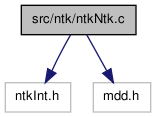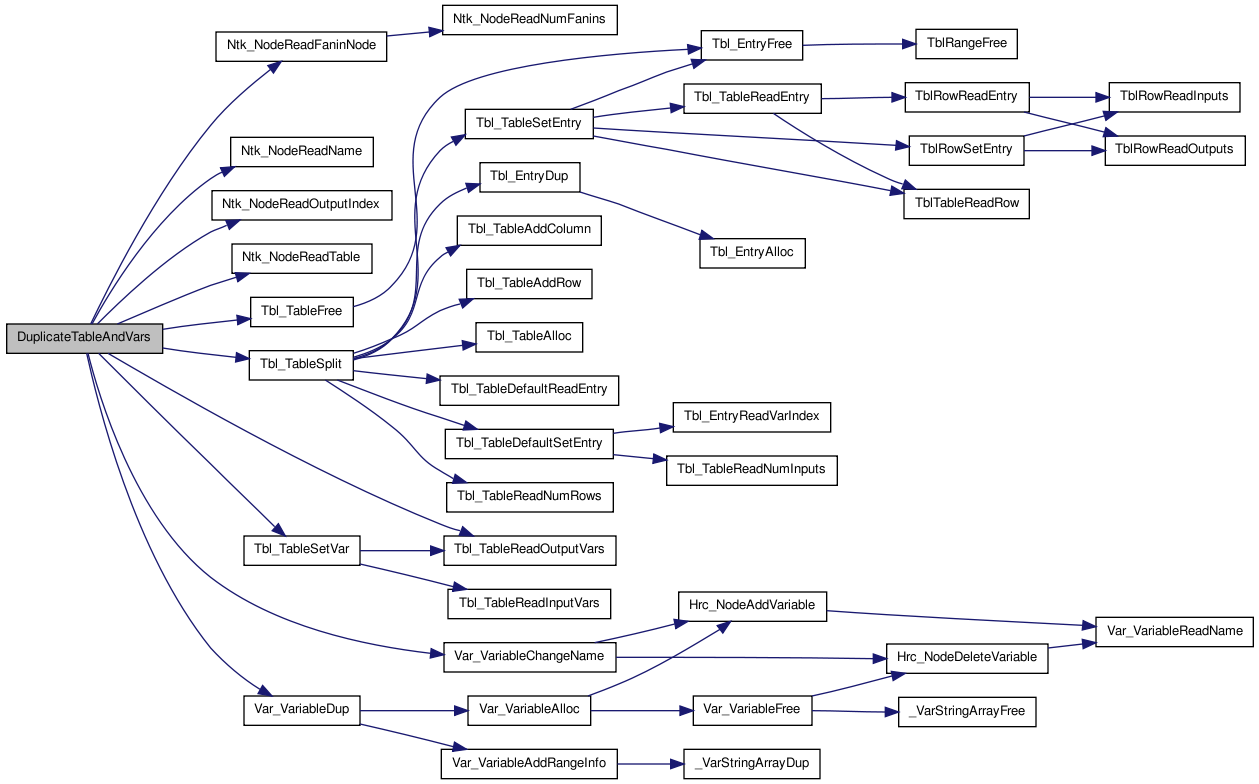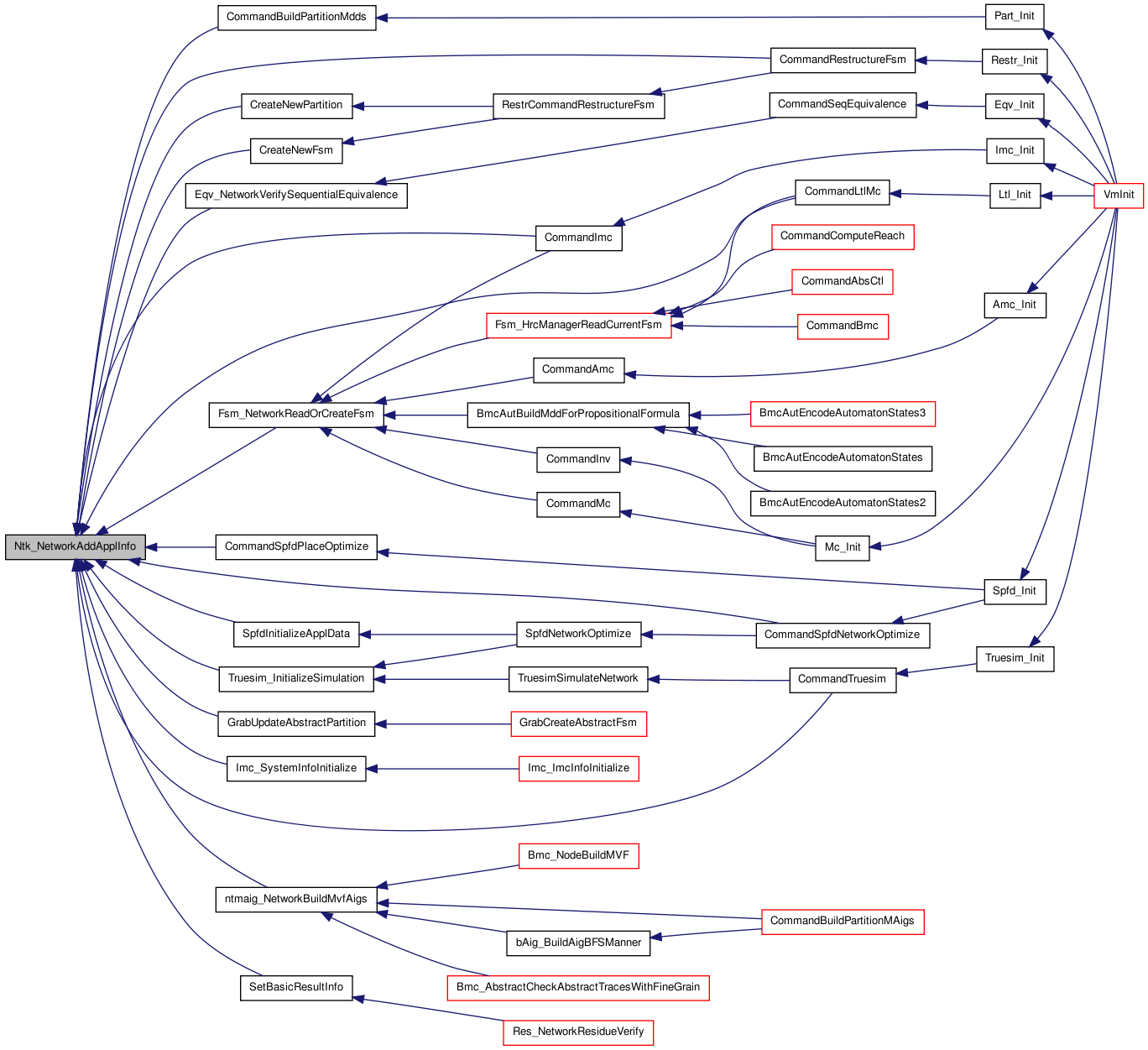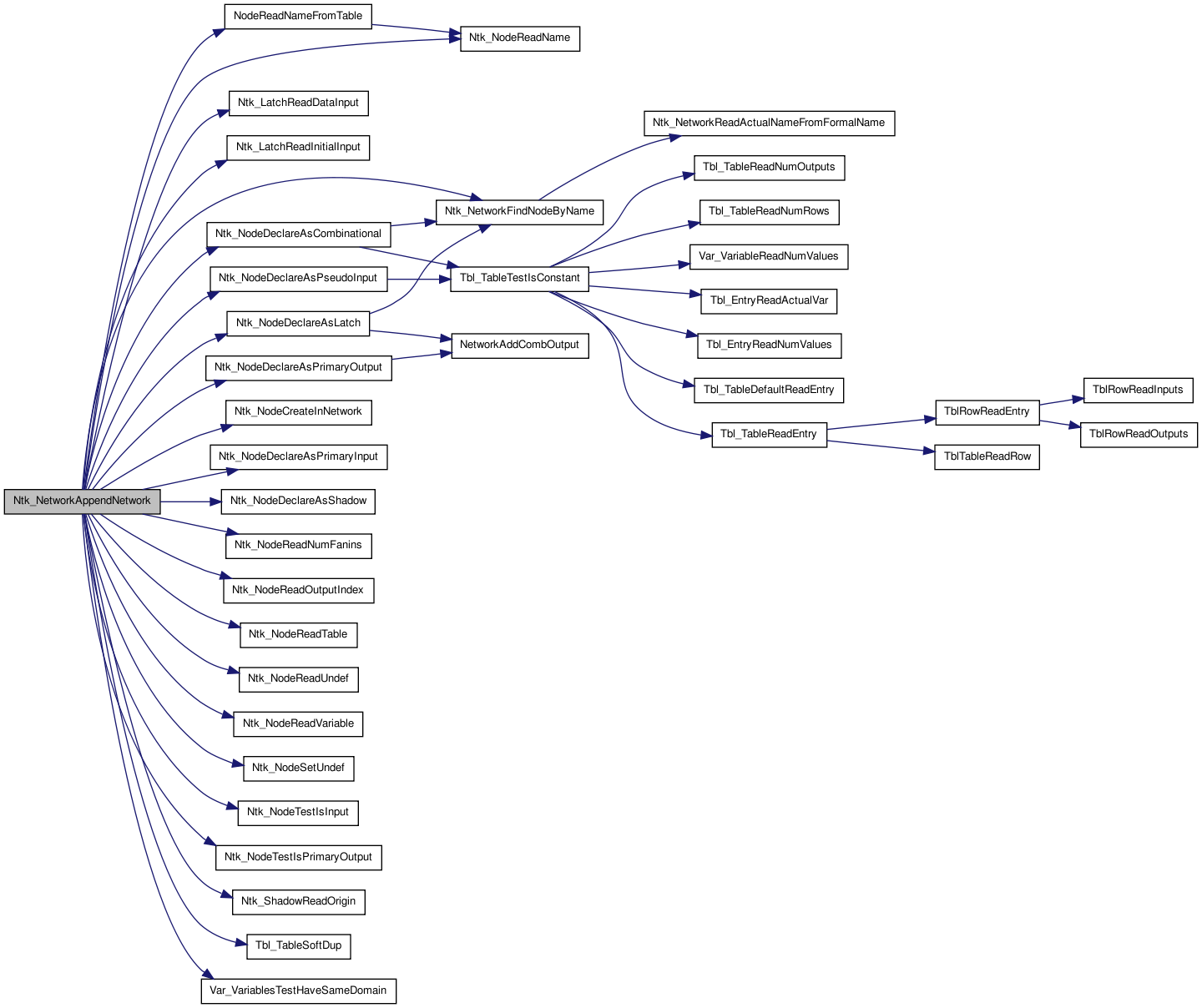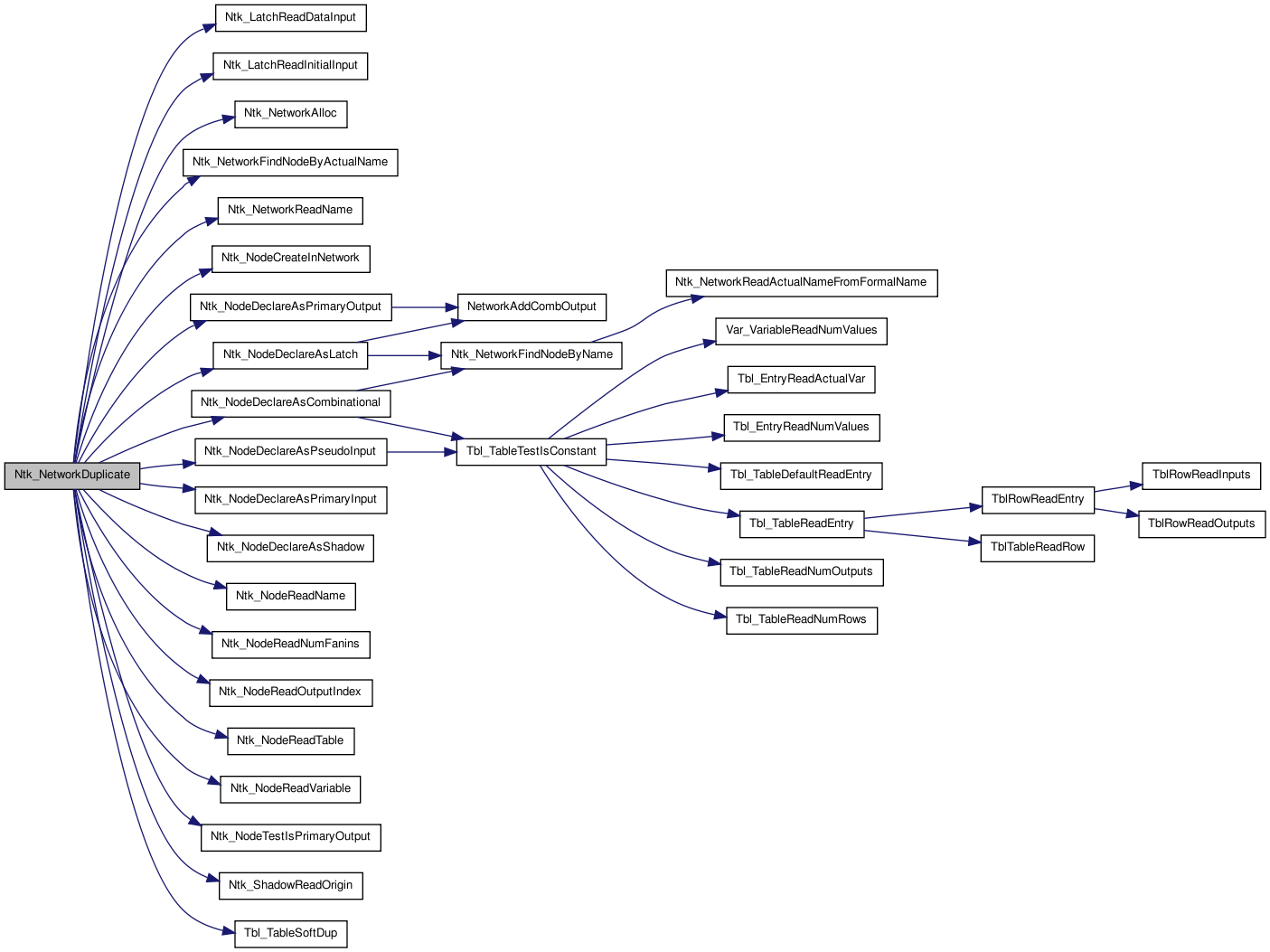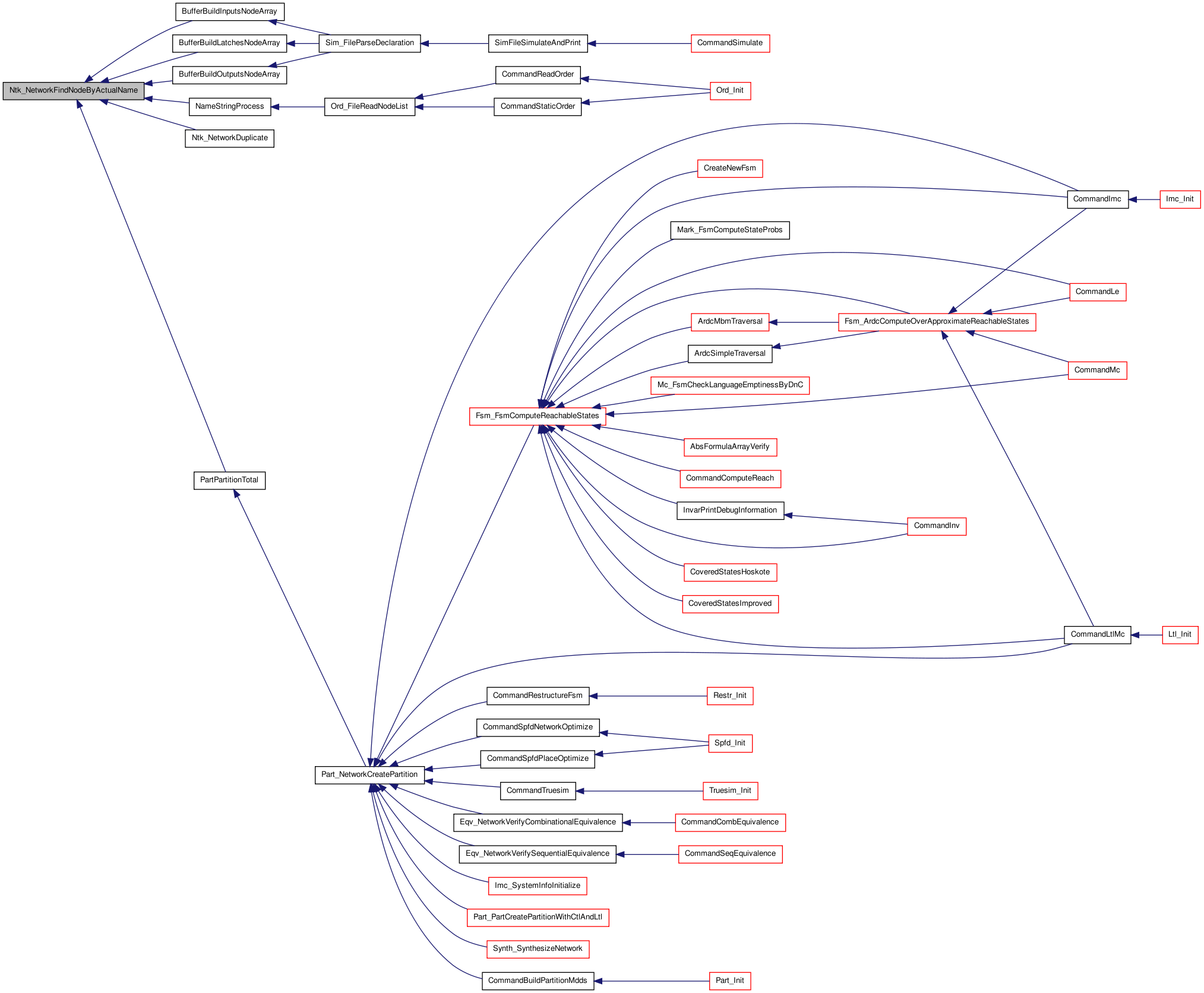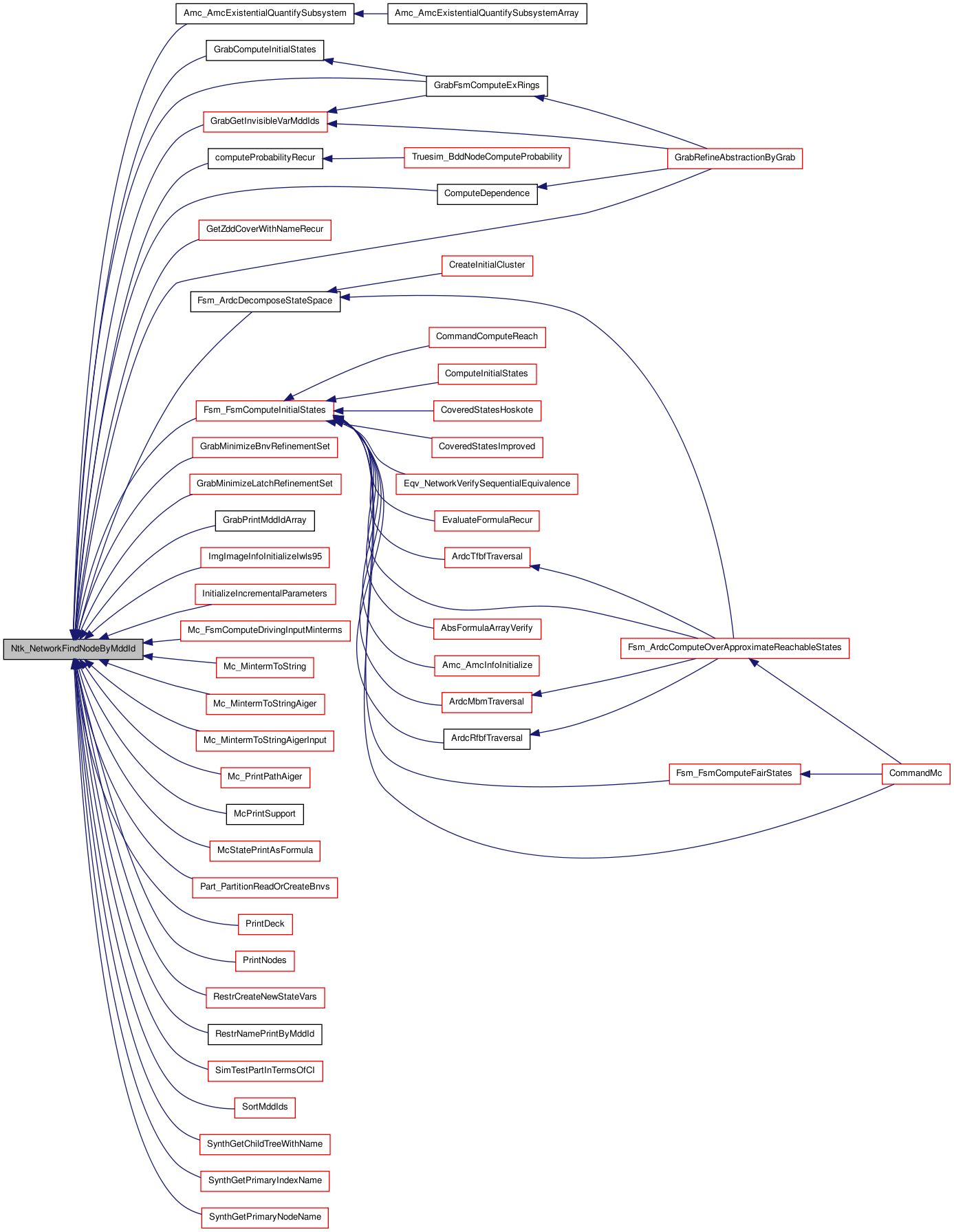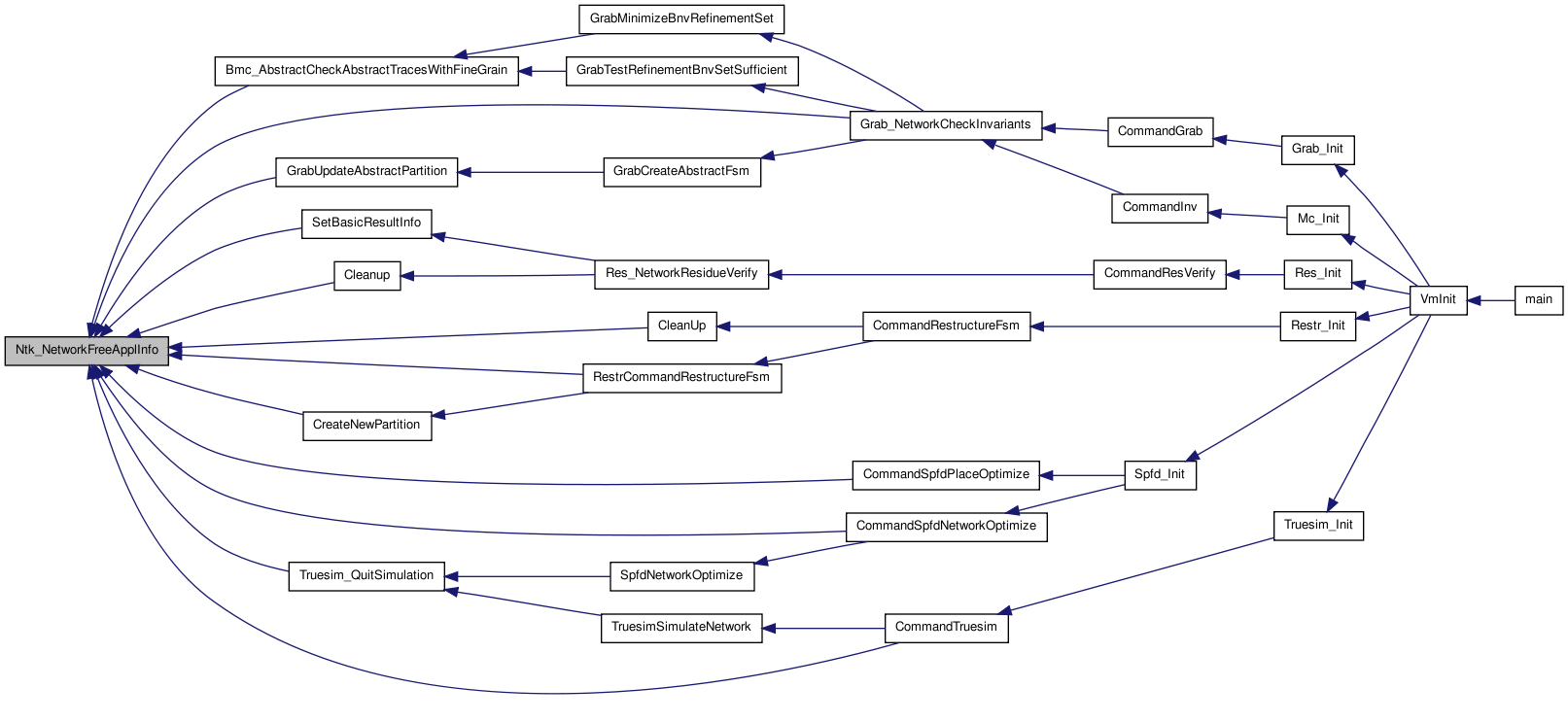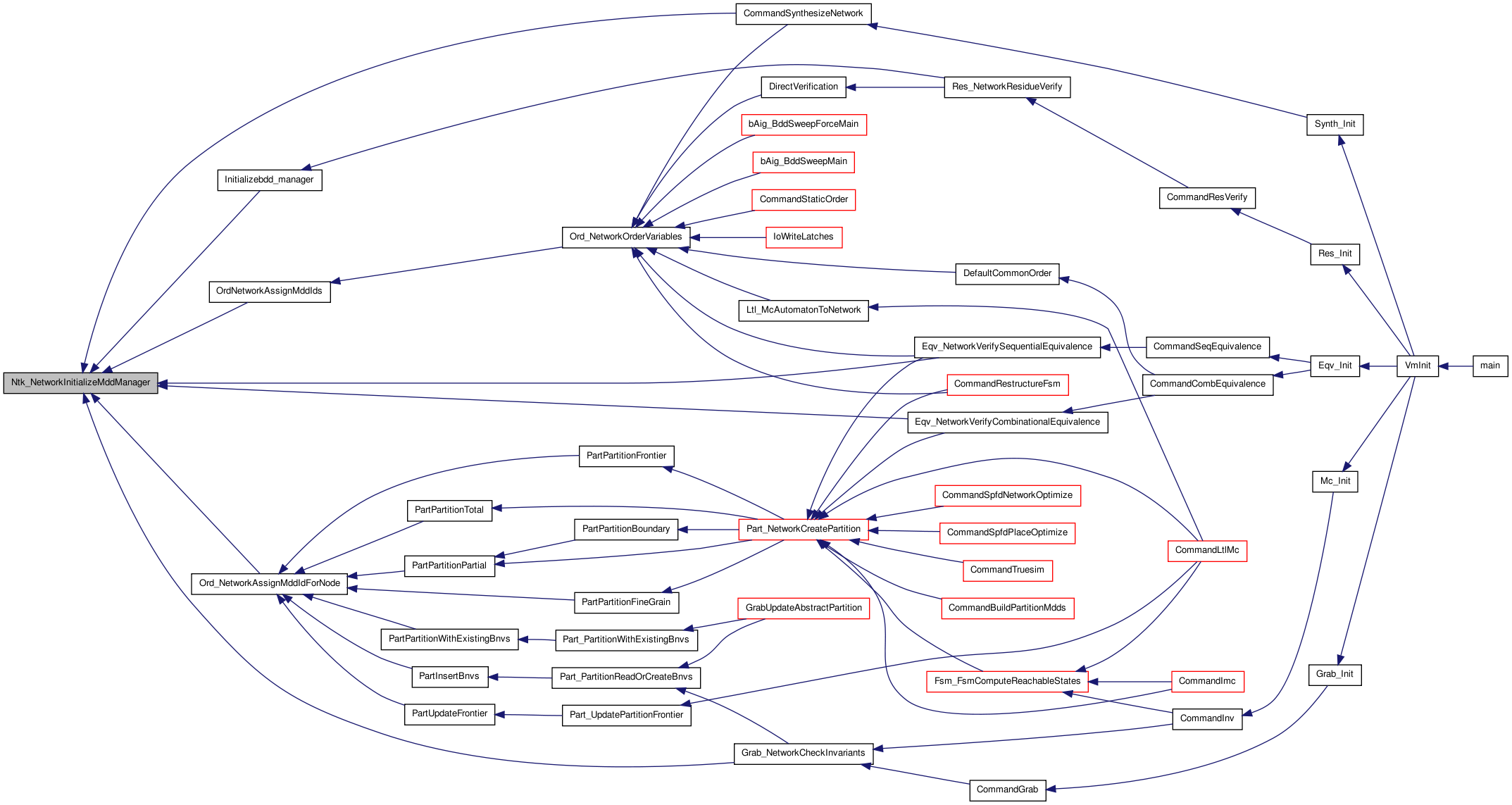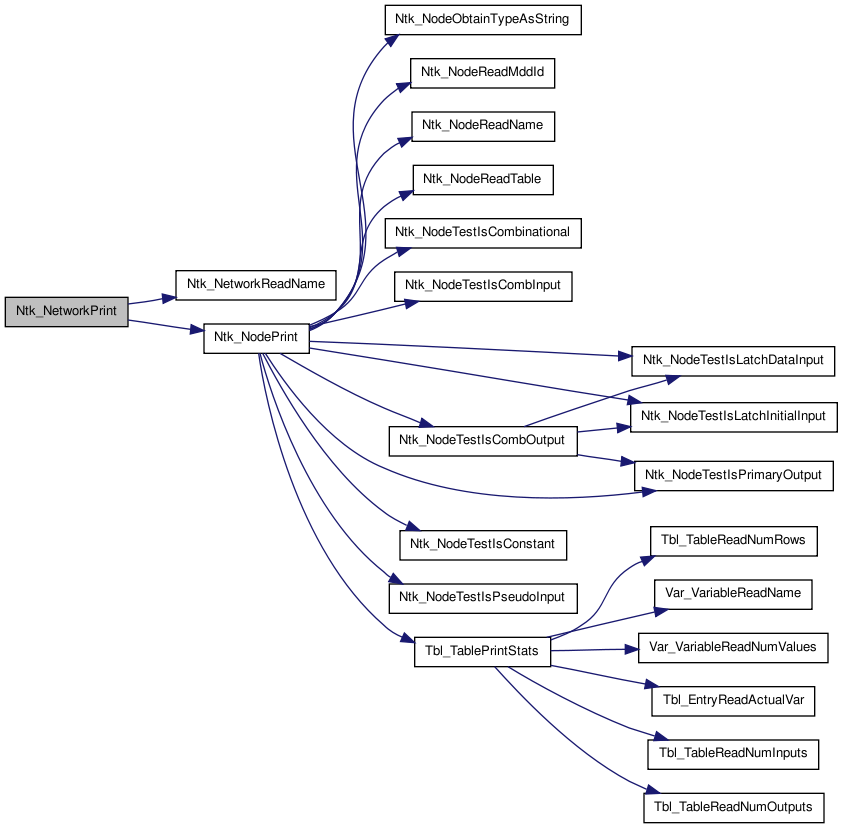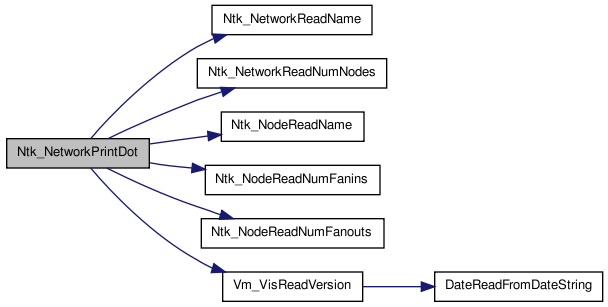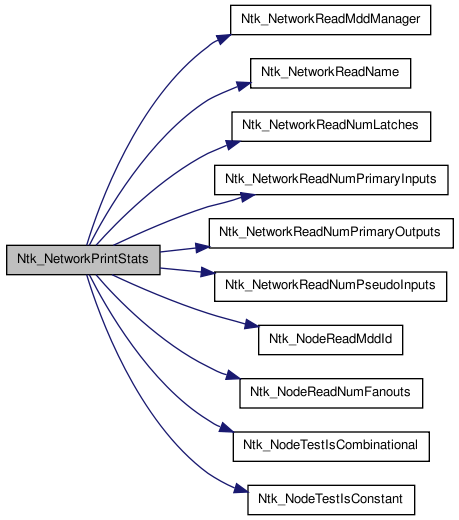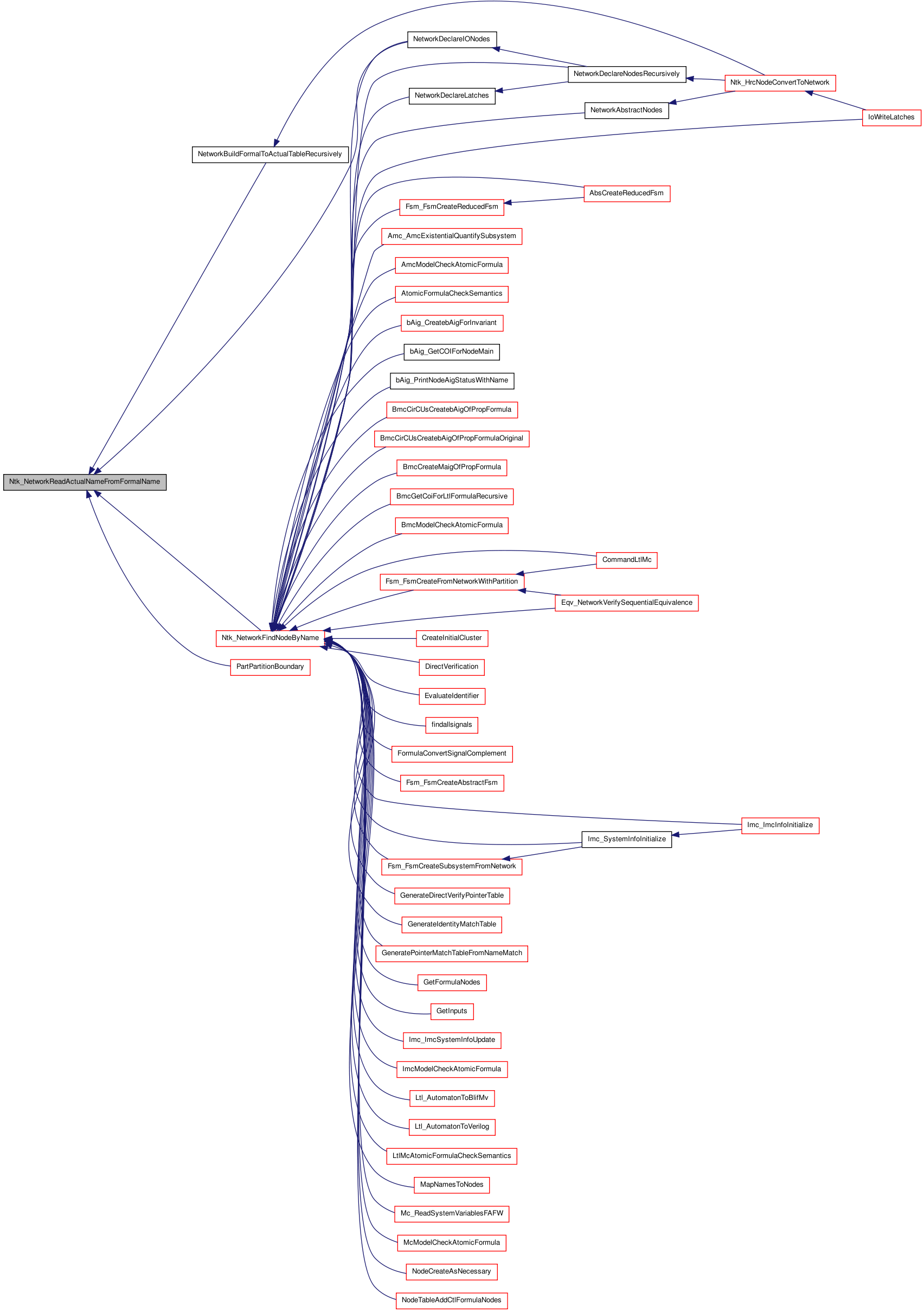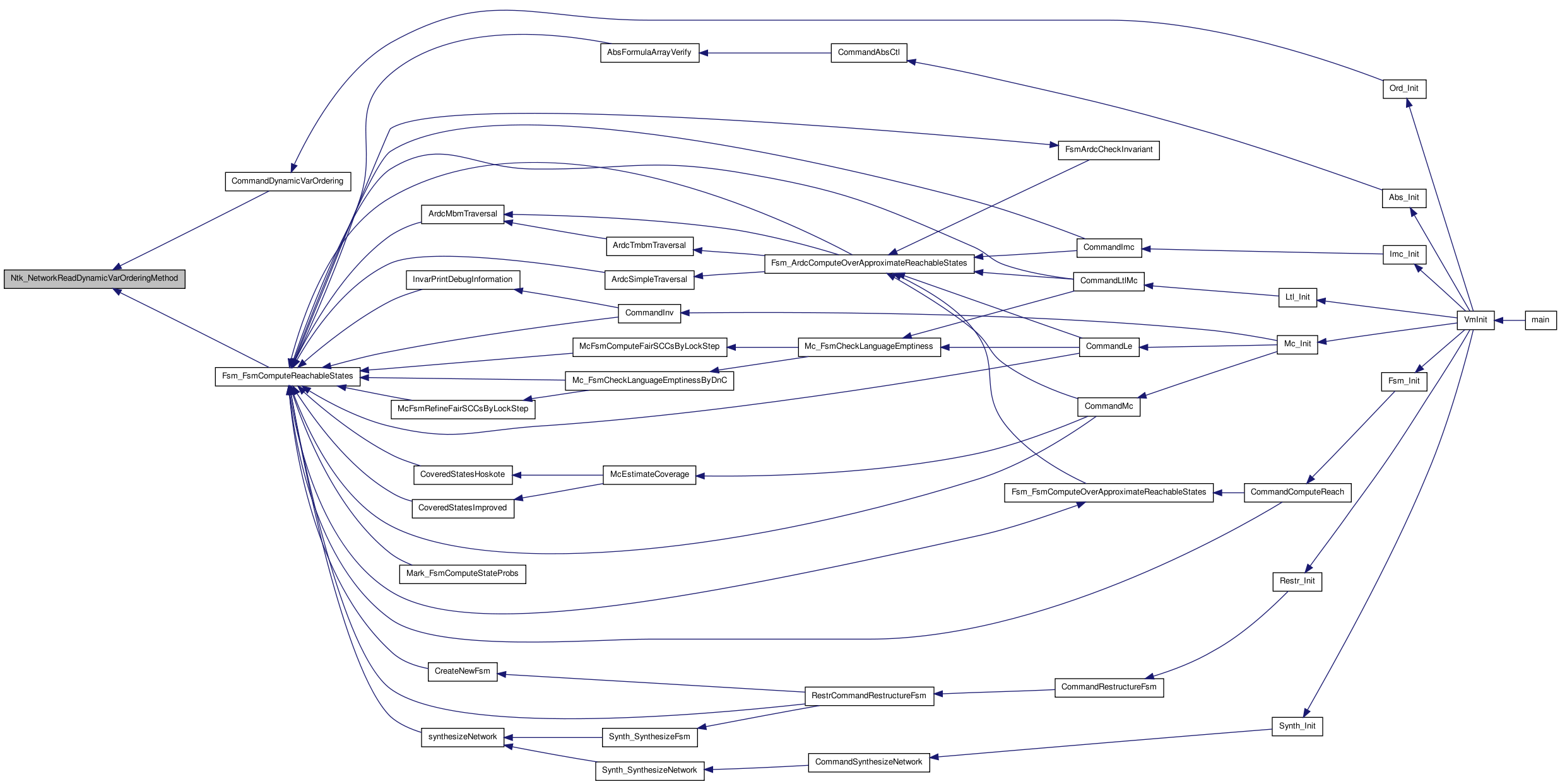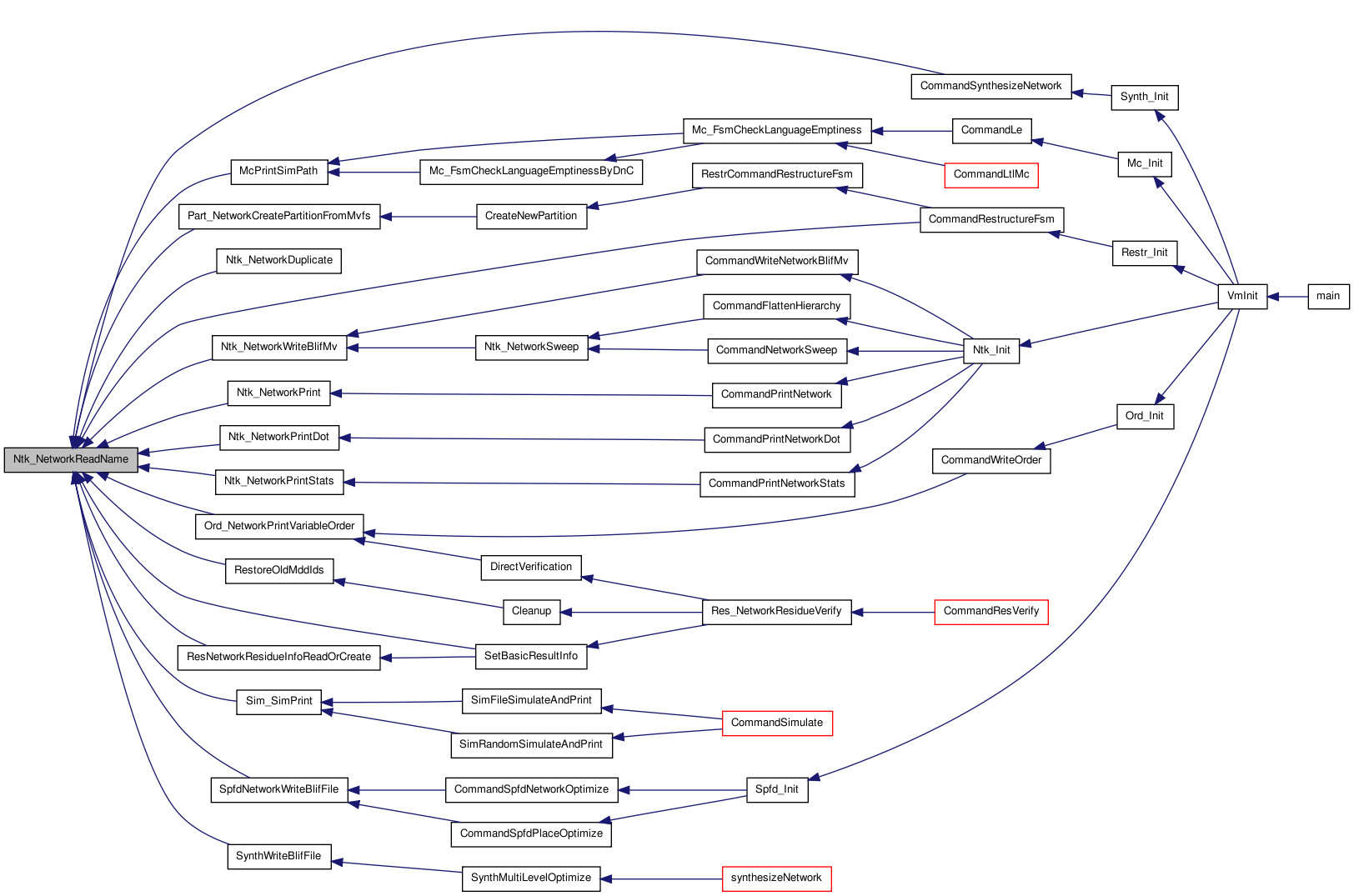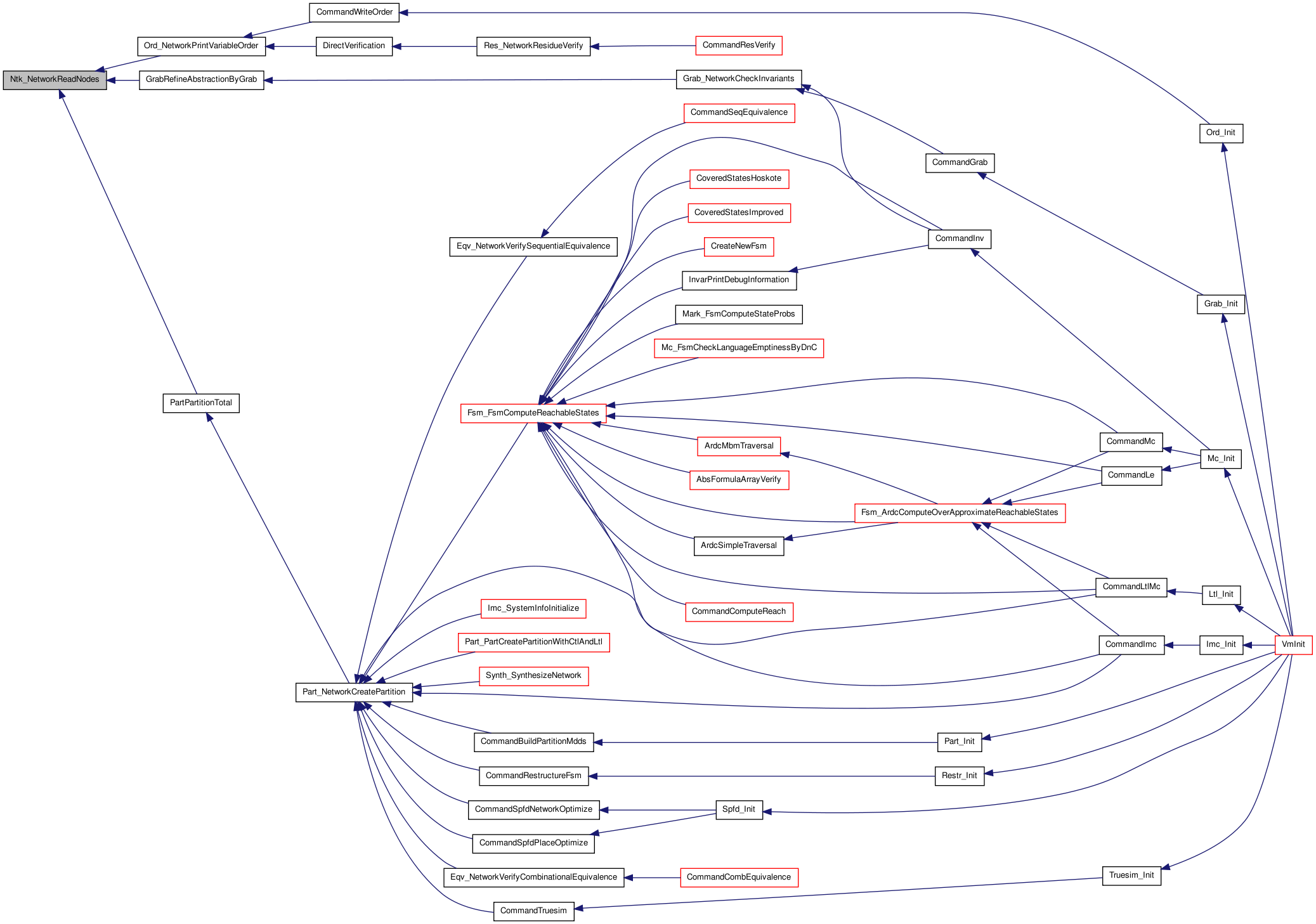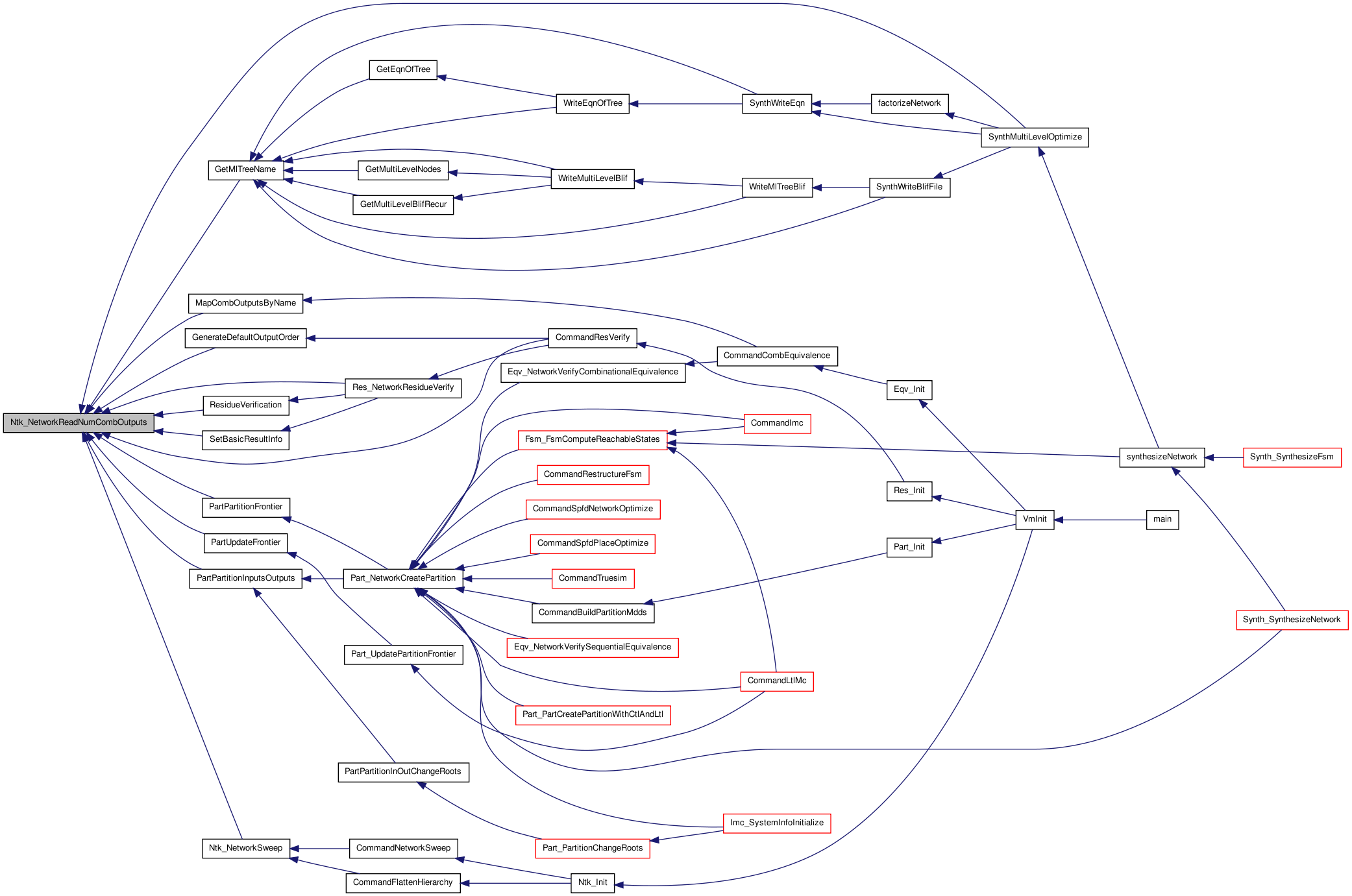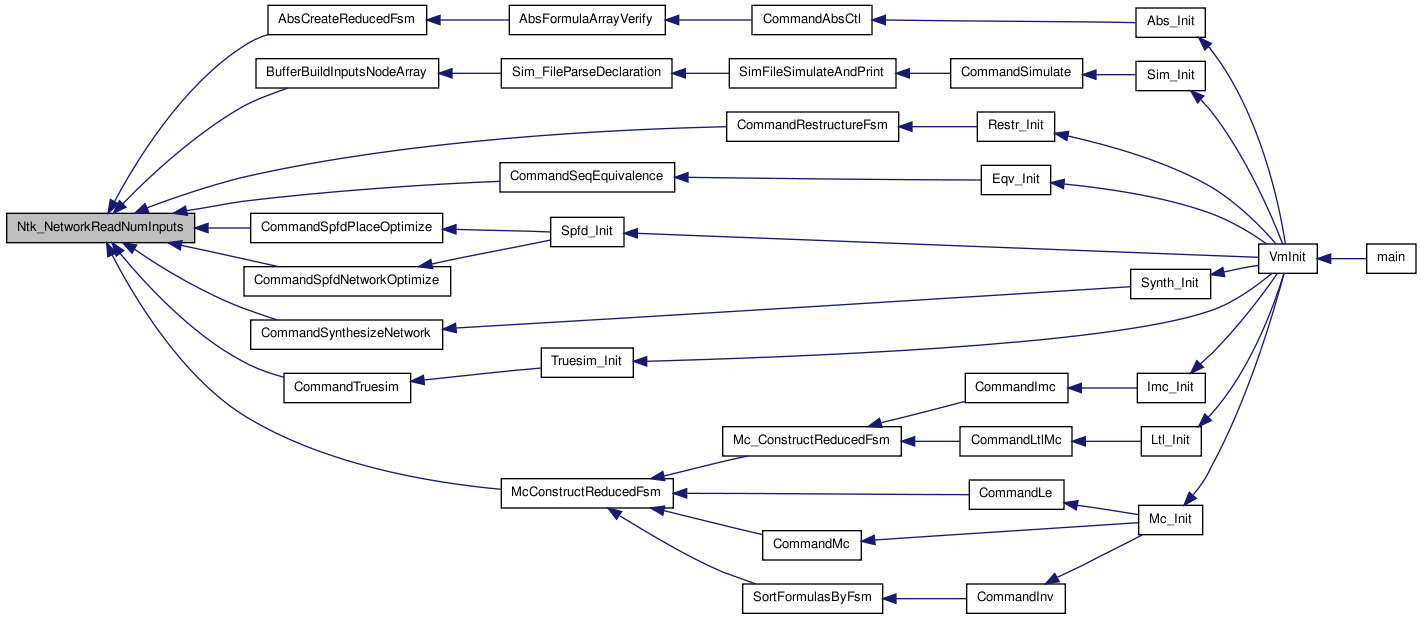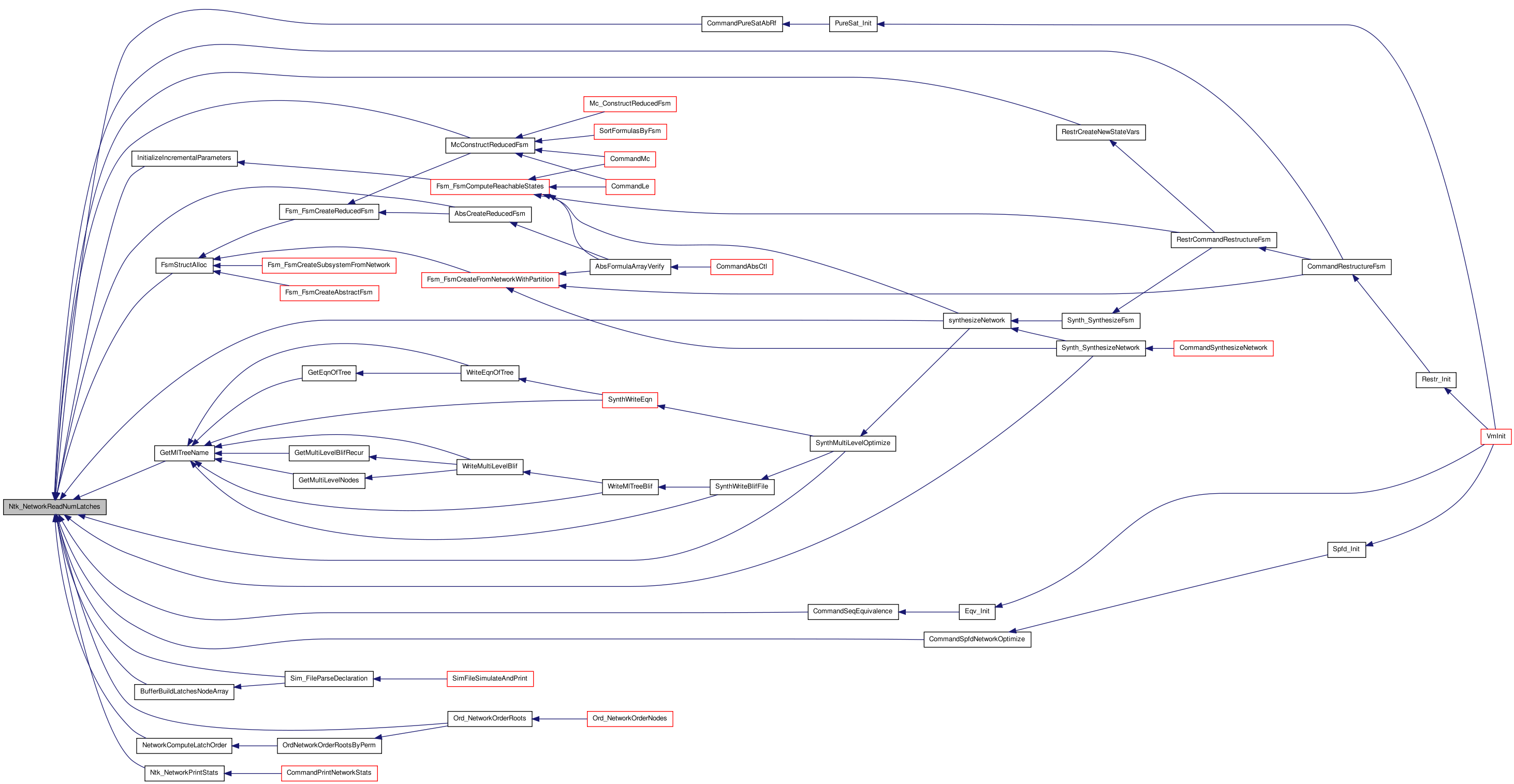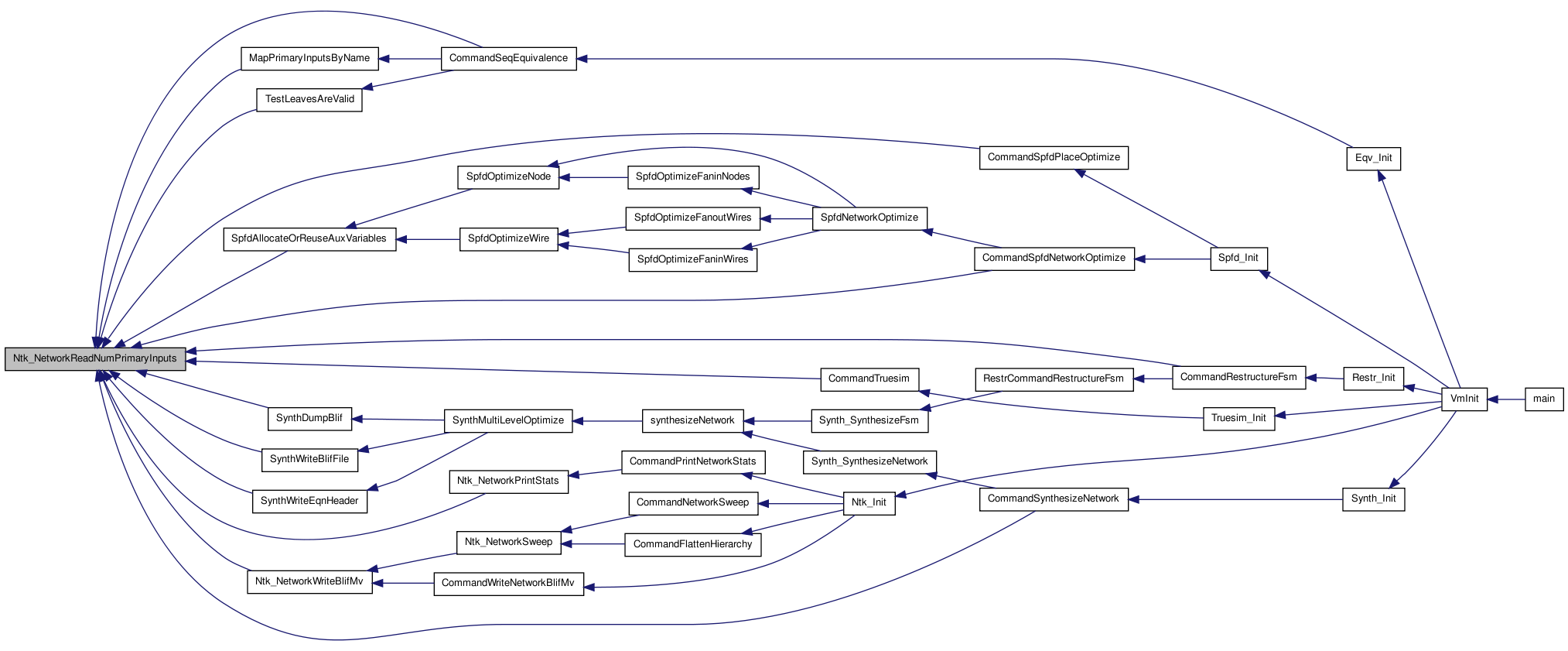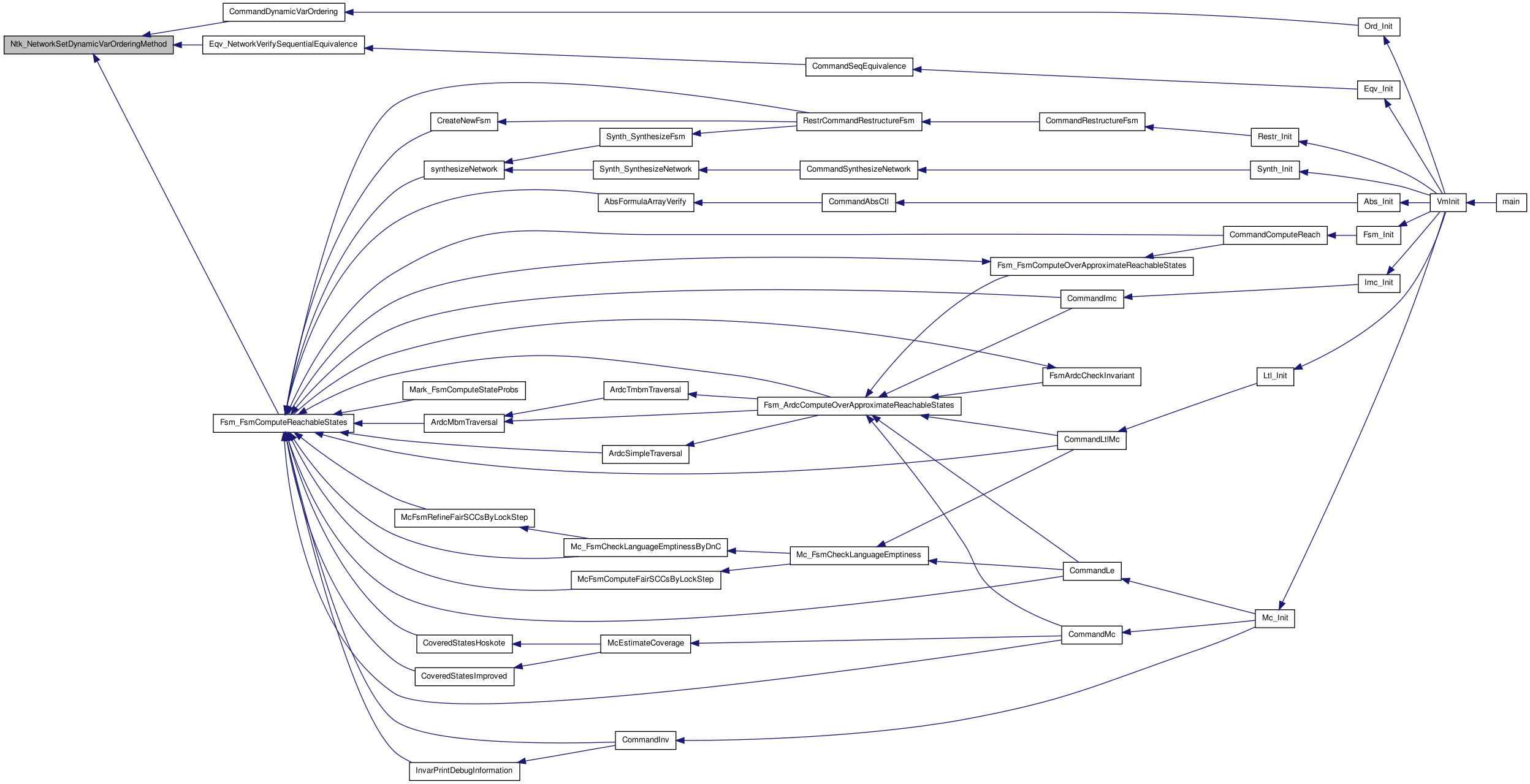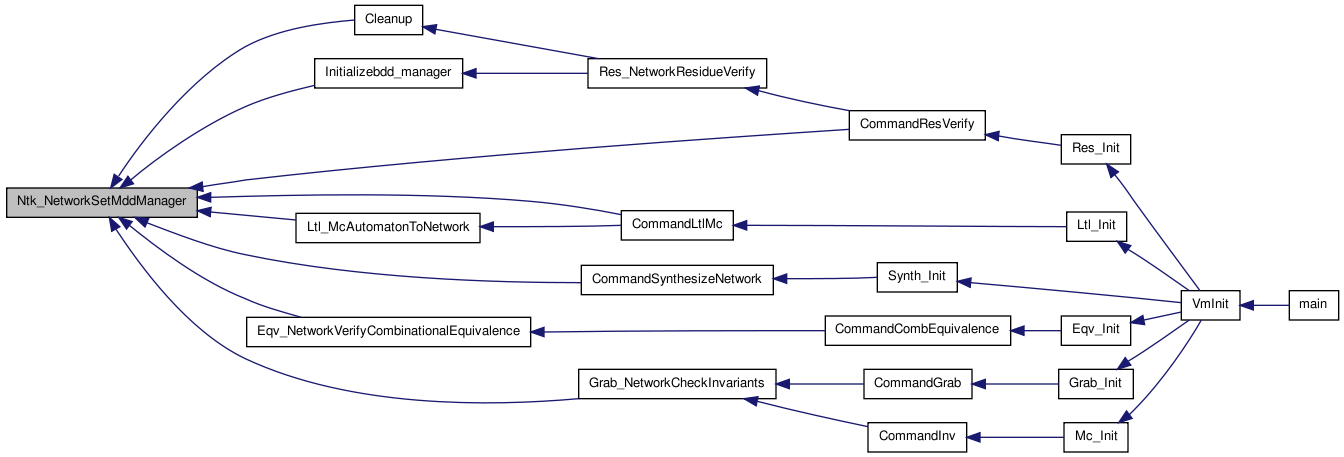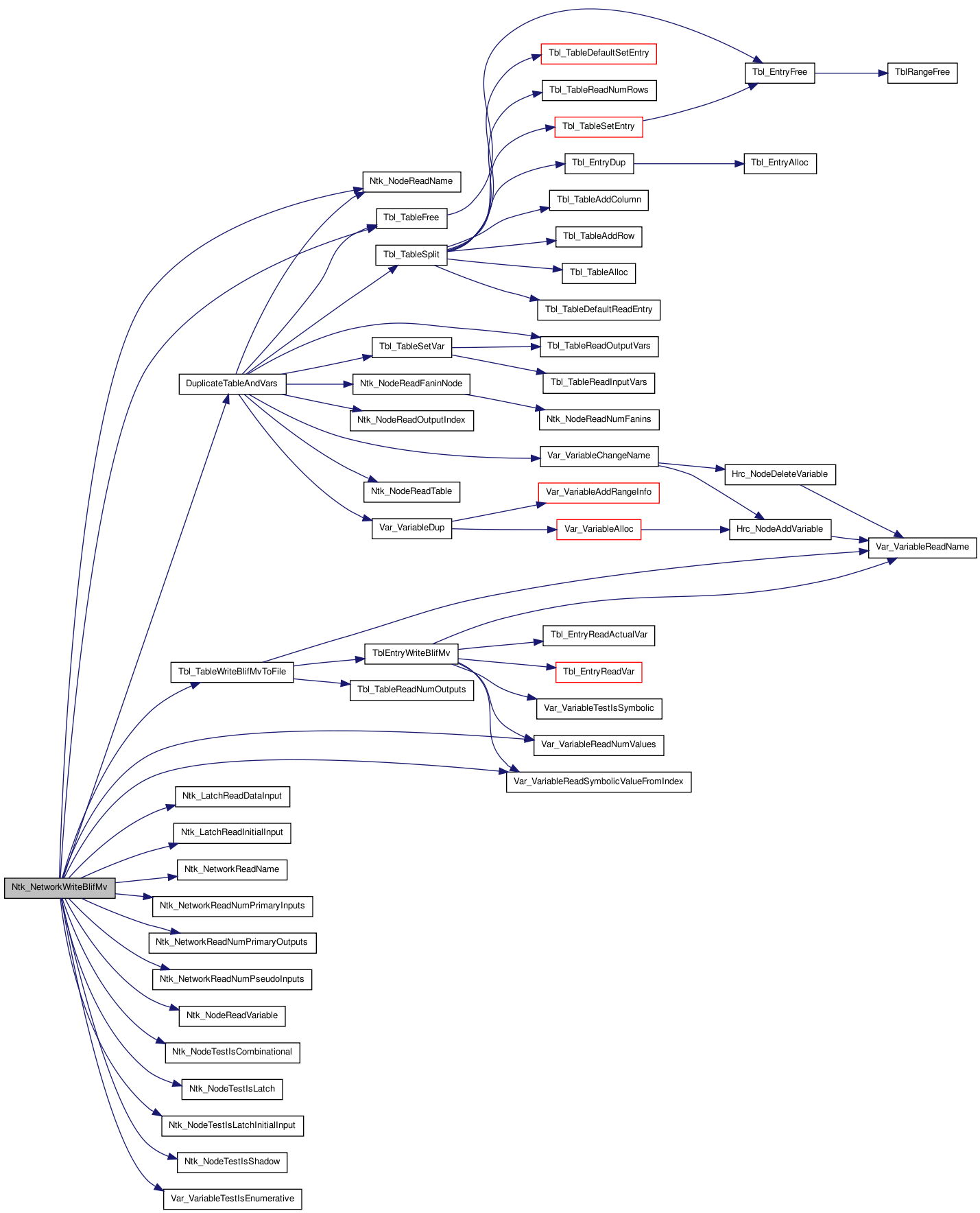src/ntk/ntkNtk.c File Reference
#include "ntkInt.h"#include "mdd.h" Include dependency graph for ntkNtk.c:
Include dependency graph for ntkNtk.c:Go to the source code of this file.
Data Structures | |
| struct | ApplInfoStruct |
Typedefs | |
| typedef struct ApplInfoStruct | ApplInfo_t |
Functions | |
| static char * | NodeReadNameFromTable (Ntk_Node_t *node, st_table *name2ToName1) |
| static Tbl_Table_t * | DuplicateTableAndVars (Ntk_Node_t *node, char *name) |
| char * | Ntk_NetworkReadName (Ntk_Network_t *network) |
| mdd_manager * | Ntk_NetworkReadMddManager (Ntk_Network_t *network) |
| void | Ntk_NetworkSetMddManager (Ntk_Network_t *network, mdd_manager *mddManager) |
| mAig_Manager_t * | Ntk_NetworkReadMAigManager (Ntk_Network_t *network) |
| void | Ntk_NetworkSetMAigManager (Ntk_Network_t *network, mAig_Manager_t *mAigManager) |
| mdd_manager * | Ntk_NetworkInitializeMddManager (Ntk_Network_t *network) |
| bdd_reorder_type_t | Ntk_NetworkReadDynamicVarOrderingMethod (Ntk_Network_t *network) |
| void | Ntk_NetworkSetDynamicVarOrderingMethod (Ntk_Network_t *network, bdd_reorder_type_t dynVarOrdMethod, bdd_reorder_verbosity_t verbosity) |
| void * | Ntk_NetworkReadUndef (Ntk_Network_t *network) |
| void | Ntk_NetworkSetUndef (Ntk_Network_t *network, void *value) |
| Ntk_Node_t * | Ntk_NetworkFindNodeByMddId (Ntk_Network_t *network, int mddId) |
| Ntk_Node_t * | Ntk_NetworkFindNodeByActualName (Ntk_Network_t *network, char *name) |
| Ntk_Node_t * | Ntk_NetworkFindNodeByName (Ntk_Network_t *network, char *name) |
| char * | Ntk_NetworkReadActualNameFromFormalName (Ntk_Network_t *network, char *formalName) |
| void | Ntk_NetworkInsertFormalNameToActualName (Ntk_Network_t *network, char *formalName, char *actualName) |
| int | Ntk_NetworkReadNumNodes (Ntk_Network_t *network) |
| int | Ntk_NetworkReadNumLatches (Ntk_Network_t *network) |
| int | Ntk_NetworkReadNumCombInputs (Ntk_Network_t *network) |
| int | Ntk_NetworkReadNumCombOutputs (Ntk_Network_t *network) |
| int | Ntk_NetworkReadNumPrimaryInputs (Ntk_Network_t *network) |
| int | Ntk_NetworkReadNumPseudoInputs (Ntk_Network_t *network) |
| int | Ntk_NetworkReadNumInputs (Ntk_Network_t *network) |
| int | Ntk_NetworkReadNumPrimaryOutputs (Ntk_Network_t *network) |
| lsList | Ntk_NetworkReadNodes (Ntk_Network_t *network) |
| lsList | Ntk_NetworkReadCombInputs (Ntk_Network_t *network) |
| lsList | Ntk_NetworkReadCombOutputs (Ntk_Network_t *network) |
| lsList | Ntk_NetworkReadLatches (Ntk_Network_t *network) |
| lsList | Ntk_NetworkReadPrimaryInputs (Ntk_Network_t *network) |
| lsList | Ntk_NetworkReadPseudoInputs (Ntk_Network_t *network) |
| lsList | Ntk_NetworkReadInputs (Ntk_Network_t *network) |
| lsList | Ntk_NetworkReadPrimaryOutputs (Ntk_Network_t *network) |
| boolean | Ntk_NetworkAddApplInfo (Ntk_Network_t *network, char *key, Ntk_ApplInfoFreeFn freeFn, void *data) |
| boolean | Ntk_NetworkSetApplInfo (Ntk_Network_t *network, char *key, Ntk_ApplInfoFreeFn freeFn, void *data) |
| void * | Ntk_NetworkReadApplInfo (Ntk_Network_t *network, char *key) |
| boolean | Ntk_NetworkFreeApplInfo (Ntk_Network_t *network, char *key) |
| Ntk_Network_t * | Ntk_NetworkAlloc (char *name) |
| void | Ntk_NetworkFree (Ntk_Network_t *network) |
| void | Ntk_NetworkFreeCallback (void *data) |
| void | Ntk_NetworkWriteBlifMv (FILE *fp, Ntk_Network_t *network, boolean promotePseudo) |
| void | Ntk_NetworkPrint (FILE *fp, Ntk_Network_t *network, boolean printIo, boolean printTableStats) |
| void | Ntk_NetworkPrintStats (FILE *fp, Ntk_Network_t *network) |
| Ntk_Network_t * | Ntk_NetworkDuplicate (Ntk_Network_t *oldNetwork) |
| void | Ntk_NetworkAppendNetwork (Ntk_Network_t *network1, Ntk_Network_t *network2, st_table *name2ToName1) |
| int | Ntk_NetworkPrintDot (FILE *fp, Ntk_Network_t *network) |
Variables | |
| static char rcsid[] | UNUSED = "$Id: ntkNtk.c,v 1.23 2010/04/09 23:44:05 fabio Exp $" |
Typedef Documentation
| typedef struct ApplInfoStruct ApplInfo_t |
Struct**********************************************************************
Synopsis [Structure to store uninterpreted application info.]
SeeAlso [Ntk_NetworkAddApplInfo]
Function Documentation
| static Tbl_Table_t * DuplicateTableAndVars | ( | Ntk_Node_t * | node, |
| char * | name | ||
| ) | [static] |
Function********************************************************************
Synopsis [Duplicate a table and corresponding variables.]
Description []
SideEffects []
SeeAlso []
Definition at line 1764 of file ntkNtk.c.
{
Var_Variable_t *var, *newVar;
Tbl_Table_t *dupTable, *tbl;
int col;
Tbl_Table_t *table = Ntk_NodeReadTable(node);
array_t *split = Tbl_TableSplit(table);
int outIndex = Ntk_NodeReadOutputIndex(node);
arrayForEachItem(Tbl_Table_t *, split, col, tbl) {
if (col == outIndex) {
dupTable = tbl;
} else {
Tbl_TableFree(tbl);
}
}
array_free(split);
Tbl_TableForEachInputVar(dupTable, col, var) {
Ntk_Node_t *fanin = Ntk_NodeReadFaninNode(node, col);
char *newName = Ntk_NodeReadName(fanin);
newVar = Var_VariableDup(var, NIL(Hrc_Node_t));
Var_VariableChangeName(newVar, newName);
Tbl_TableSetVar(dupTable, col, newVar, 0);
}
var = array_fetch(Var_Variable_t *,Tbl_TableReadOutputVars(dupTable), 0);
newVar = Var_VariableDup(var, NIL(Hrc_Node_t));
Var_VariableChangeName(newVar, name);
Tbl_TableSetVar(dupTable, 0, newVar, 1);
return dupTable;
} /* DuplicateTableAndVars */
 Here is the call graph for this function:
Here is the call graph for this function: Here is the caller graph for this function:
Here is the caller graph for this function:| static char * NodeReadNameFromTable | ( | Ntk_Node_t * | node, |
| st_table * | name2ToName1 | ||
| ) | [static] |
AutomaticStart
Function********************************************************************
Synopsis [Returns node name from table.]
Description [Given a node, uses the name of the node as key to lookup the corresponding (new) name for the node. If the node does not exist as a key in the table, then fails. The returned string should not be freed.]
SideEffects []
Definition at line 1739 of file ntkNtk.c.
{
char *name1 = NIL(char);
char *name2 = Ntk_NodeReadName(node);
boolean status UNUSED = st_lookup(name2ToName1, name2, &name1);
assert(status);
return name1;
}
 Here is the call graph for this function:
Here is the call graph for this function: Here is the caller graph for this function:
Here is the caller graph for this function:| boolean Ntk_NetworkAddApplInfo | ( | Ntk_Network_t * | network, |
| char * | key, | ||
| Ntk_ApplInfoFreeFn | freeFn, | ||
| void * | data | ||
| ) |
Function********************************************************************
Synopsis [Associates application specified data with a network.]
Description [Adds the key/data pair to the network's applInfoTable. Key may be an arbitrary string; to avoid possible conflicts with other applications, key should be prefixed with the application's package name, for example "Pkg_NetworkApplKey". The contents of data are arbitrary; the network package does not interpret the data. The freeFn is called on data when a network is freed, or when Ntk_NetworkFreeApplInfo is called with the same value of key. The freeFn takes (void *) as its only argument, and returns void. A copy is made of the string key before it is inserted into applInfoTable.
If this function is called with a key that already exists in the applInfoTable, then the data for the previous entry is freed using the freeFn, a new entry is created using the freeFn and data supplied as arguments, and TRUE is returned. Otherwise, FALSE is returned.
WARNING: This function does not make a copy of data before inserting it into the table. By calling this function, the application is surrendering responsibility to the network to free the data. Once this function is called on data, the data should be freed only by calling Ntk_NetworkFreeApplInfo or Ntk_NetworkFree. In other words, it is an error for the application to explicitly free the data without using one of these two functions. ]
SideEffects []
SeeAlso [Ntk_NetworkFreeApplInfo Ntk_NetworkReadApplInfo]
Definition at line 782 of file ntkNtk.c.
{
ApplInfo_t *applInfo;
boolean status;
if (st_lookup(network->applInfoTable, key, &applInfo)) {
(*applInfo->freeFn)(applInfo->data);
status = TRUE;
}
else {
char *keyCopy = util_strsav(key);
applInfo = ALLOC(ApplInfo_t, 1);
st_insert(network->applInfoTable, keyCopy, (char *) applInfo);
status = FALSE;
}
applInfo->freeFn = freeFn;
applInfo->data = data;
return status;
}
 Here is the caller graph for this function:
Here is the caller graph for this function:| Ntk_Network_t* Ntk_NetworkAlloc | ( | char * | name | ) |
Function********************************************************************
Synopsis [Allocates a network with a name.]
Description [Allocates a network with a name (a copy of name is made first). Name must be non-NULL. The remaining fields are initialized to empty (e.g. empty lists, empty hash tables) or NULL (mddManager). The dynVarOrdMethod is set to BDD_REORDER_NONE.]
SideEffects []
SeeAlso [Ntk_NetworkFree]
Definition at line 931 of file ntkNtk.c.
{
Ntk_Network_t *network = ALLOC(Ntk_Network_t, 1);
network->name = util_strsav(name);
network->nodes = lsCreate();
network->combInputs = lsCreate();
network->combOutputs = lsCreate();
network->latches = lsCreate();
network->primaryInputs = lsCreate();
network->pseudoInputs = lsCreate();
network->inputs = lsCreate();
network->primaryOutputs = lsCreate();
network->combOutputsTable = st_init_table(st_ptrcmp, st_ptrhash);
network->mddIdToNode = st_init_table(st_numcmp, st_numhash);
network->actualNameToNode = st_init_table(strcmp, st_strhash);
network->formalNameToActualName = st_init_table(strcmp, st_strhash);
network->applInfoTable = st_init_table(strcmp, st_strhash);
network->mddManager = NIL(mdd_manager);
network->mAigManager = NIL(mAig_Manager_t);
network->dynVarOrdMethod = BDD_REORDER_NONE;
network->undef = NIL(void);
return network;
}
 Here is the caller graph for this function:
Here is the caller graph for this function:| void Ntk_NetworkAppendNetwork | ( | Ntk_Network_t * | network1, |
| Ntk_Network_t * | network2, | ||
| st_table * | name2ToName1 | ||
| ) |
Function********************************************************************
Synopsis [Appends network2 to network1.]
Description [Appends network2 to network1. Network2 is not modified, but network1 is modified. Name1ToName2 is a hash table mapping char* keys to char* values (the table should use st_strhash and strcmp). The set of keys is an arbitrary subset (including empty set) of the set of names of the inputs (primary and pseudo) of network2. The value of each key is the name of an arbitrary node in network1.
The inputs of network2 can be divided into 3 types: I - those appearing in name2ToName1 as keys, II - those not appearing in name2ToName1, but which have nodes with the same names in network1, and III - all other inputs (i.e. those neither appearing in name2ToName1, nor having nodes of the same names in network1). An input of type II could be equivalently specified as a type I input, where the key and value are the same. If there are no type I inputs, an empty symbol table should be provided.
A node of network2 is appended to network1 if it is a type III input, or it is not an input. All appended nodes have the string $NTK2 added to the end of their names. Inputs of type I or II are not appended to network1. When a node of network2 is appended to network1, if there exists a fanin of the node that is a type I or II input, then that fanin is modified to refer to the node in network1 corresponding to the type I or II. The MDD ids of the appended nodes are unassigned. The tables of the appended nodes are "soft duplicates" of the original tables in network2; they should not be modified.
Note that it is impossible for the set of fanins of a node (originally) in network1 to be modified. The only changes that occur to the original nodes of network1 are that the fanout sets will increase for those nodes corresponding to type I or II inputs of network2.
The application information of network1 is not modified; the information should be invalidated by the caller as necessary. The MDD manager of network1 is not modified in any way. The formalNameToActualName table of network1 is not updated to reflect the addition of the nodes from network2. Currently, it is assumed that type I and II inputs do not have shadow nodes.
!!! Chao Says: I have changed all the FindNodeByActualName with FindNodeByName, since the later one subsume the former. replace Ntk_NetworkFindNodeByActualName(network1, name1); with Ntk_NetworkFindNodeByName(network1, name1); ]
SideEffects [Network1 is modified.]
SeeAlso [Ntk_NetworkDuplicate Ntk_NetworkFreeApplInfo]
Definition at line 1460 of file ntkNtk.c.
{
st_generator *stGen;
lsGen gen;
Ntk_Node_t *node1;
Ntk_Node_t *node2;
char *name1;
char *name2;
st_table *localName2ToName1 = st_init_table(strcmp, st_strhash);
/*
* For each node in network2, create a node in network1 as necessary. The
* undef field of node2 is set to TRUE if a new node is created in network1
* for it; else, it is set to FALSE. localName2ToName1 is a superset of
* name2ToName1; in addition to the contents of name2ToName1, it contains
* the new names (those appended with $NTK2) for those nodes being appended
* to network2, and type II inputs.
*/
Ntk_NetworkForEachNode(network2, gen, node2) {
name1 = NIL(char);
name2 = Ntk_NodeReadName(node2);
st_lookup(name2ToName1, name2, &name1);
if (name1 != NIL(char)) {
/*
* Name2 is in name2ToName1 table (type I input). Hence, we will be
* using the node in network1 corresponding to name1. Assert that node2
* is in fact an input, that name1 refers to an input node in network1, and
* that node1 and node2 have the same variable domains.
*/
Ntk_NodeSetUndef(node2, (void *) FALSE);
st_insert(localName2ToName1, name2, util_strsav(name1));
assert(Ntk_NodeTestIsInput(node2));
node1 = Ntk_NetworkFindNodeByName(network1, name1);
assert(node1 != NIL(Ntk_Node_t));
assert(Var_VariablesTestHaveSameDomain(Ntk_NodeReadVariable(node1),
Ntk_NodeReadVariable(node2)));
}
else {
/*
* Name2 is *not* in name2ToName1 table. There are 2 possibilities: 1)
* a node with name2 already exists in network1, and node2 is an input
* (type II input); in this case, a) add map of name2 to name2 in the
* localName2ToName1, b) assert that node1 is in fact an input, and c)
* don't create a new node in network1; 2) a node with name2 doesn't
* exist in network1, or node2 is not an input (type III inputs and
* non-inputs); in this case, we unconditionally create a new node in
* network1 using name2$NTK2.
*/
node1 = Ntk_NetworkFindNodeByName(network1, name2);
if ((node1 != NIL(Ntk_Node_t)) && Ntk_NodeTestIsInput(node2)) {
Ntk_NodeSetUndef(node2, (void *) FALSE);
st_insert(localName2ToName1, name2, util_strsav(name2));
}
else {
char *newName = util_strcat3(name2, "$NTK2", "");
Ntk_NodeSetUndef(node2, (void *) TRUE);
st_insert(localName2ToName1, name2, newName);
(void) Ntk_NodeCreateInNetwork(network1, newName,
Ntk_NodeReadVariable(node2));
}
}
}
/*
* For each node in network2 for which a new node was created in network1,
* declare the corresponding node in network1 using the type of the node2.
* (NOTE: this section shares a lot with Ntk_NetworkDuplicate, but is
* sufficiently different that we don't share any code.)
*/
Ntk_NetworkForEachNode(network2, gen, node2) {
if (Ntk_NodeReadUndef(node2) == NIL(void)) {
/*
* node2 is superseded by a node in network1.
*/
continue;
}
name2 = NodeReadNameFromTable(node2, localName2ToName1);
node1 = Ntk_NetworkFindNodeByName(network1, name2);
assert(node1 != NIL(Ntk_Node_t));
/*
* Handle items that are independent of node type.
*/
if (Ntk_NodeTestIsPrimaryOutput(node2)) {
Ntk_NodeDeclareAsPrimaryOutput(node1);
}
switch (node2->type) {
case NtkPrimaryInput_c:
Ntk_NodeDeclareAsPrimaryInput(node1);
break;
case NtkPseudoInput_c:
Ntk_NodeDeclareAsPseudoInput(node1,
Tbl_TableSoftDup(Ntk_NodeReadTable(node2)),
Ntk_NodeReadOutputIndex(node2));
break;
case NtkLatch_c:
{
char *dataName = NodeReadNameFromTable(Ntk_LatchReadDataInput(node2),
localName2ToName1);
char *initName = NodeReadNameFromTable(Ntk_LatchReadInitialInput(node2),
localName2ToName1);
Ntk_NodeDeclareAsLatch(node1, dataName, initName);
break;
}
case NtkCombinational_c:
{
int i;
Ntk_Node_t *faninNode2;
array_t *faninNameArray;
/*
* Create the array of names of the fanins of node2.
*/
faninNameArray = array_alloc(char *, Ntk_NodeReadNumFanins(node2));
Ntk_NodeForEachFanin(node2, i, faninNode2) {
char *faninName = NodeReadNameFromTable(faninNode2, localName2ToName1);
array_insert(char *, faninNameArray, i, faninName);
}
Ntk_NodeDeclareAsCombinational(node1,
Tbl_TableSoftDup(Ntk_NodeReadTable(node2)),
faninNameArray,
Ntk_NodeReadOutputIndex(node2));
array_free(faninNameArray);
break;
}
case NtkShadow_c:
{
char *originName;
Ntk_Node_t *originNode2;
Ntk_Node_t *originNode1;
originNode2 = Ntk_ShadowReadOrigin(node2);
/*
* Currently, we don't allow a shadow node whose origin in a type I or
* II input. This is because, what if the corresponding node in
* network1 (of the type I or II input), also has a shadow node? Then
* we would try to add a shadow node to a node already having a shadow;
* this is illegal.
*/
assert((boolean) (long) Ntk_NodeReadUndef(node2));
originName = NodeReadNameFromTable(originNode2, localName2ToName1);
originNode1 = Ntk_NetworkFindNodeByName(network1, originName);
Ntk_NodeDeclareAsShadow(node1, originNode1);
break;
}
case NtkUnassigned_c:
fail("Unexpected unassigned node type");
break;
default:
fail("Unexpected type");
break;
}
}
/*
* Free all the values strings in the localName2ToName1, before freeing
* the table itself. The keys are not freed.
*/
st_foreach_item(localName2ToName1, stGen, &name2, &name1) {
FREE(name1);
}
st_free_table(localName2ToName1);
}
 Here is the call graph for this function:
Here is the call graph for this function: Here is the caller graph for this function:
Here is the caller graph for this function:| Ntk_Network_t* Ntk_NetworkDuplicate | ( | Ntk_Network_t * | oldNetwork | ) |
Function********************************************************************
Synopsis [Duplicates a network.]
Description [Duplicates a network. The network name and all node names are preserved. The new network does not have an MDD manager. The nodes of the new network have unassigned MDD ids. The tables (Tbl_Table_t) of the new nodes are "soft duplicates" of the original tables in oldNetwork; they should not be modified. The application information (ApplInfo) of the new network is empty. The formalNameToActualName table of the new network is empty.]
SideEffects []
SeeAlso [Ntk_NetworkFree Ntk_NetworkAppendNetwork]
Definition at line 1321 of file ntkNtk.c.
{
int i;
lsGen gen;
Ntk_Node_t *oldNode;
Ntk_Node_t *oldFaninNode;
Ntk_Node_t *oldOriginNode;
Ntk_Node_t *newOriginNode;
array_t *faninNameArray;
Ntk_Network_t *newNetwork = Ntk_NetworkAlloc(Ntk_NetworkReadName(oldNetwork));
/*
* For each node in oldNetwork, create a node in newNetwork.
*/
Ntk_NetworkForEachNode(oldNetwork, gen, oldNode) {
(void) Ntk_NodeCreateInNetwork(newNetwork, Ntk_NodeReadName(oldNode),
Ntk_NodeReadVariable(oldNode));
}
/*
* For each node in oldNetwork, declare the corresponding node in newNetwork
* using the type of the oldNode.
*/
Ntk_NetworkForEachNode(oldNetwork, gen, oldNode) {
char *nodeName = Ntk_NodeReadName(oldNode);
Ntk_Node_t *newNode = Ntk_NetworkFindNodeByActualName(newNetwork, nodeName);
assert(newNode != NIL(Ntk_Node_t));
/*
* Handle items that are independent of node type.
*/
if (Ntk_NodeTestIsPrimaryOutput(oldNode)) {
Ntk_NodeDeclareAsPrimaryOutput(newNode);
}
switch (oldNode->type) {
case NtkPrimaryInput_c:
Ntk_NodeDeclareAsPrimaryInput(newNode);
break;
case NtkPseudoInput_c:
Ntk_NodeDeclareAsPseudoInput(newNode,
Tbl_TableSoftDup(Ntk_NodeReadTable(oldNode)),
Ntk_NodeReadOutputIndex(oldNode));
break;
case NtkLatch_c:
Ntk_NodeDeclareAsLatch(newNode,
Ntk_NodeReadName(Ntk_LatchReadDataInput(oldNode)),
Ntk_NodeReadName(Ntk_LatchReadInitialInput(oldNode)));
break;
case NtkCombinational_c:
/*
* Create the array of names of the fanins of oldNode.
*/
faninNameArray = array_alloc(char *, Ntk_NodeReadNumFanins(oldNode));
Ntk_NodeForEachFanin(oldNode, i, oldFaninNode) {
char *faninName = Ntk_NodeReadName(oldFaninNode);
array_insert(char *, faninNameArray, i, faninName);
}
Ntk_NodeDeclareAsCombinational(newNode,
Tbl_TableSoftDup(Ntk_NodeReadTable(oldNode)),
faninNameArray,
Ntk_NodeReadOutputIndex(oldNode));
array_free(faninNameArray);
break;
case NtkShadow_c:
oldOriginNode = Ntk_ShadowReadOrigin(oldNode);
newOriginNode = Ntk_NetworkFindNodeByActualName(newNetwork,
Ntk_NodeReadName(oldOriginNode));
Ntk_NodeDeclareAsShadow(newNode, newOriginNode);
break;
case NtkUnassigned_c:
fail("Unexpected unassigned node type");
break;
default:
fail("Unexpected type");
break;
}
}
return (newNetwork);
}
 Here is the call graph for this function:
Here is the call graph for this function:| Ntk_Node_t* Ntk_NetworkFindNodeByActualName | ( | Ntk_Network_t * | network, |
| char * | name | ||
| ) |
Function********************************************************************
Synopsis [Finds a node in a network by its actual name.]
Description [Finds a node in a network by its actual name. The actual name of a node is the name stored with the node (i.e returned by Ntk_NodeReadName). If the name doesn't correspond to an existing node in the network, a NULL pointer is returned.]
SideEffects []
SeeAlso [Ntk_NetworkReadActualNameFromFormalName Ntk_NodeReadName]
Definition at line 345 of file ntkNtk.c.
{
Ntk_Node_t *node = NIL(Ntk_Node_t);
st_lookup(network->actualNameToNode, name, &node);
return (node);
}
 Here is the caller graph for this function:
Here is the caller graph for this function:| Ntk_Node_t* Ntk_NetworkFindNodeByMddId | ( | Ntk_Network_t * | network, |
| int | mddId | ||
| ) |
Function********************************************************************
Synopsis [Finds a node in a network by its MDD id.]
Description [Finds a node in a network by its MDD id. The MDD id of a node is the MDD id returned by Ntk_NodeReadMddId. If the MDD id doesn't correspond to an existing node in the network, a NULL pointer is returned. Also, if MDD id is equal to NTK_UNASSIGNED_MDD_ID, a NULL pointer is returned.]
SideEffects []
SeeAlso [Ntk_NodeSetMddId Ntk_NodeReadMddId]
Definition at line 316 of file ntkNtk.c.
{
Ntk_Node_t *node = NIL(Ntk_Node_t);
if (mddId != NTK_UNASSIGNED_MDD_ID) {
st_lookup(network->mddIdToNode, (char *) (long) mddId, &node);
}
return (node);
}
 Here is the caller graph for this function:
Here is the caller graph for this function:| Ntk_Node_t* Ntk_NetworkFindNodeByName | ( | Ntk_Network_t * | network, |
| char * | name | ||
| ) |
Function********************************************************************
Synopsis [Finds a node in a network by its formal name, or actual name.]
Description [Finds a node in a network by its name. First, the formal name to actual name table is checked to see if there is an actual name corresponding to the name. If so, then the node corresponding to the actual name is returned. If there is no corresponding actual name, then it's assumed that the name is an actual name, and the corresponding node is returned. If no corresponding node is found, then a NULL pointer is returned.]
SideEffects []
SeeAlso [Ntk_NetworkReadActualNameFromFormalName Ntk_NetworkFindNodeByActualName]
Definition at line 376 of file ntkNtk.c.
{
Ntk_Node_t *node = NIL(Ntk_Node_t);
char *actualName = Ntk_NetworkReadActualNameFromFormalName(network, name);
/*
* If there was no actual name corresponding to name in the formal to actual
* table, then treat name as an actualName.
*/
if (actualName == NIL(char)) {
actualName = name;
}
st_lookup(network->actualNameToNode, actualName, &node);
return (node);
}
 Here is the call graph for this function:
Here is the call graph for this function:| void Ntk_NetworkFree | ( | Ntk_Network_t * | network | ) |
Function********************************************************************
Synopsis [Frees all the memory associated with a network.]
Description [Calls Ntk_NodeFree on each node of network, and then frees the data local to network, and the network itself. Also frees the MDD manager of the network, if it is not NULL. If network is NULL, just returns.]
SideEffects []
SeeAlso [Ntk_NetworkAlloc Ntk_NodeFree]
Definition at line 973 of file ntkNtk.c.
{
char *formal;
char *actual;
char *key;
ApplInfo_t *applInfo;
Ntk_Node_t *node;
lsGen gen;
st_generator *stGen;
if (network == NIL(Ntk_Network_t)) {
return;
}
FREE(network->name);
Ntk_NetworkForEachNode(network, gen, node) {
Ntk_NodeFree(node);
}
(void) lsDestroy(network->nodes, (void (*) (lsGeneric)) NULL);
(void) lsDestroy(network->combInputs, (void (*) (lsGeneric)) NULL);
(void) lsDestroy(network->combOutputs, (void (*) (lsGeneric)) NULL);
(void) lsDestroy(network->latches, (void (*) (lsGeneric)) NULL);
(void) lsDestroy(network->primaryInputs, (void (*) (lsGeneric)) NULL);
(void) lsDestroy(network->pseudoInputs, (void (*) (lsGeneric)) NULL);
(void) lsDestroy(network->inputs, (void (*) (lsGeneric)) NULL);
(void) lsDestroy(network->primaryOutputs, (void (*) (lsGeneric)) NULL);
st_free_table(network->combOutputsTable);
st_free_table(network->mddIdToNode);
/*
* The keys in this table are strings representing node names. The strings
* are owned by the nodes, so we don't free them here.
*/
st_free_table(network->actualNameToNode);
/*
* Free all the strings in the formalNameToActualName table before freeing
* the table itself.
*/
st_foreach_item(network->formalNameToActualName, stGen, &formal, &actual) {
FREE(formal);
FREE(actual);
}
st_free_table(network->formalNameToActualName);
/*
* Free all the key/applInfo pairs in the applInfoTable, and then free the
* table itself.
*/
st_foreach_item(network->applInfoTable, stGen, &key, &applInfo) {
FREE(key);
(*applInfo->freeFn)(applInfo->data);
FREE(applInfo);
}
st_free_table(network->applInfoTable);
if (network->mddManager != NIL(mdd_manager)) {
mdd_quit(network->mddManager);
}
if (network->mAigManager != NIL(mAig_Manager_t)) {
mAig_quit(network->mAigManager);
}
FREE(network);
}
 Here is the call graph for this function:
Here is the call graph for this function: Here is the caller graph for this function:
Here is the caller graph for this function:| boolean Ntk_NetworkFreeApplInfo | ( | Ntk_Network_t * | network, |
| char * | key | ||
| ) |
Function********************************************************************
Synopsis [Frees application-specified data from a network.]
Description [If data corresponding to key exists in the network, then frees the data using the associated free function, removes the key/data pair from the network's applInfoTable, and returns TRUE. If key does not exist, then the function does nothing and returns FALSE.
WARNING: This function should be called only if a corresponding call to Ntk_NetworkAddApplInfo has already been made.]
SideEffects []
SeeAlso [Ntk_NetworkAddApplInfo Ntk_NetworkReadApplInfo]
Definition at line 896 of file ntkNtk.c.
{
int status;
ApplInfo_t *applInfo;
status = st_lookup(network->applInfoTable, key, &applInfo);
if (status == 1) {
st_delete(network->applInfoTable, &key, &applInfo);
(*applInfo->freeFn)(applInfo->data);
FREE(key); /* frees the string contained in the table */
FREE(applInfo);
}
return ((status) ? TRUE : FALSE);
}
 Here is the caller graph for this function:
Here is the caller graph for this function:| void Ntk_NetworkFreeCallback | ( | void * | data | ) |
Function********************************************************************
Synopsis [Callback function to free a network.]
Description [Typecasts data to (Ntk_Network_t *) and then calls Ntk_NetworkFree. This function should only be used as a callback for other applications that don't know the network type, for example the Hrc_Node ApplInfoTable.]
SideEffects []
SeeAlso [Ntk_NetworkFree]
Definition at line 1061 of file ntkNtk.c.
{
Ntk_NetworkFree((Ntk_Network_t *) data);
}
 Here is the call graph for this function:
Here is the call graph for this function: Here is the caller graph for this function:
Here is the caller graph for this function:| mdd_manager* Ntk_NetworkInitializeMddManager | ( | Ntk_Network_t * | network | ) |
Function********************************************************************
Synopsis [Creates and initializes an empty MDD manager for a network.]
Description [Creates and initializes an empty MDD manager for a network. Sets the MDD manager field of the network, and returns a pointer to the newly created manager.]
SideEffects []
SeeAlso [Ntk_NetworkReadMddManager Ntk_NetworkSetMddManager]
Definition at line 194 of file ntkNtk.c.
{
network->mddManager = mdd_init_empty();
return (network->mddManager);
}
 Here is the caller graph for this function:
Here is the caller graph for this function:| void Ntk_NetworkInsertFormalNameToActualName | ( | Ntk_Network_t * | network, |
| char * | formalName, | ||
| char * | actualName | ||
| ) |
Function********************************************************************
Synopsis [Creates correspondence from formalName to actualName.]
Description [Creates correspondence from formalName to actualName. Copies are made of formalName and actualName before storing them.]
SideEffects []
SeeAlso [Ntk_NetworkReadActualNameFromFormalName]
Definition at line 438 of file ntkNtk.c.
{
char *formalNameCopy = util_strsav(formalName);
char *actualNameCopy = util_strsav(actualName);
st_insert(network->formalNameToActualName, formalNameCopy, actualNameCopy);
}
 Here is the caller graph for this function:
Here is the caller graph for this function:| void Ntk_NetworkPrint | ( | FILE * | fp, |
| Ntk_Network_t * | network, | ||
| boolean | printIo, | ||
| boolean | printTableStats | ||
| ) |
Function********************************************************************
Synopsis [Prints information about a network.]
Description [Prints name of network, and calls Ntk_NodePrint on each node of network.]
SideEffects []
SeeAlso [Ntk_NodePrint]
Definition at line 1199 of file ntkNtk.c.
{
Ntk_Node_t *node;
lsGen gen;
(void) fprintf(fp, "Nodes of network %s:\n", Ntk_NetworkReadName(network));
Ntk_NetworkForEachNode(network, gen, node) {
Ntk_NodePrint(fp, node, printIo, printTableStats);
/*
* It's nice to have a line separating nodes when we print the fanins and
* fanouts or table stats.
*/
if (printIo || printTableStats) {
(void) fprintf(fp, "\n");
}
}
}
 Here is the call graph for this function:
Here is the call graph for this function: Here is the caller graph for this function:
Here is the caller graph for this function:| int Ntk_NetworkPrintDot | ( | FILE * | fp, |
| Ntk_Network_t * | network | ||
| ) |
Function********************************************************************
Synopsis [print a description of the topology of the network in dot format]
Description [The format used for the description is dot, a tool for graph visualization developed at AT&T. It can be obtained from http://www.research.att.com/orgs/ssr/book/reuse. The function receives as a parameter a file pointer in case the print wants to be redirected. This function is used by the command routine CommandPrintNetworkDot.]
SideEffects []
Definition at line 1657 of file ntkNtk.c.
{
lsGen gen;
int i;
Ntk_Node_t *nodePtr;
Ntk_Node_t *fanoutPtr;
time_t now = time(0);
struct tm *nowStructPtr = localtime(& now);
char *nowTxt = asctime(nowStructPtr);
char *networkName = Ntk_NetworkReadName(network);
/*
* Write out the header for the output file.
*/
(void) fprintf(fp, "# %s\n", Vm_VisReadVersion());
(void) fprintf(fp, "# network name: %s\n", networkName);
(void) fprintf(fp, "# generated: %s", nowTxt);
(void) fprintf(fp, "#\n");
(void) fprintf(fp, "# Network with %d nodes\n",
Ntk_NetworkReadNumNodes(network));
(void) fprintf(fp, "digraph \"%s\" {\n rotate=90;\n", networkName);
(void) fprintf(fp, " margin=0.5;\n label=\"%s\";\n", networkName);
(void) fprintf(fp, " size=\"10,7.5\";\n ratio=\"fill\";\n");
/* Force the inputs and outputs to be printed at the same level in the graph */
(void) fprintf(fp, " { rank=same; ");
Ntk_NetworkForEachCombInput(network,gen, nodePtr) {
(void) fprintf(fp, "\"%s\"; ", Ntk_NodeReadName(nodePtr));
}
(void) fprintf(fp, "}\n");
(void) fprintf(fp, " { rank=same; ");
Ntk_NetworkForEachCombOutput(network,gen, nodePtr) {
(void) fprintf(fp, "\"%s\"; ", Ntk_NodeReadName(nodePtr));
}
(void) fprintf(fp, "}\n");
/* Print all the edges */
Ntk_NetworkForEachNode(network, gen, nodePtr) {
if (Ntk_NodeReadNumFanouts(nodePtr) == 0 &&
Ntk_NodeReadNumFanins(nodePtr) == 0) {
/* Print the dot description for a node */
(void) fprintf(fp, " \"%s\";\n", Ntk_NodeReadName(nodePtr));
} /* End of if */
/* Print the edges comming out of that node */
Ntk_NodeForEachFanout(nodePtr, i, fanoutPtr) {
(void) fprintf(fp, " \"%s\" -> \"%s\";\n", Ntk_NodeReadName(nodePtr),
Ntk_NodeReadName(fanoutPtr));
}
}
(void) fprintf(fp, "}\n");
return 1;
}
 Here is the call graph for this function:
Here is the call graph for this function: Here is the caller graph for this function:
Here is the caller graph for this function:| void Ntk_NetworkPrintStats | ( | FILE * | fp, |
| Ntk_Network_t * | network | ||
| ) |
Function********************************************************************
Synopsis [Prints statistics about a network.]
Description [Prints the following information about a network: name, number of combinational nodes, number of primary inputs, number of primary outputs, number of latches.]
SideEffects []
Definition at line 1235 of file ntkNtk.c.
{
lsGen gen;
Ntk_Node_t *node;
int numConstants = 0;
int numCombinational = 0;
int numEdges = 0;
mdd_manager *mddMgr;
/*
* Count the number of constants and the number of combinational nodes.
*/
Ntk_NetworkForEachNode(network, gen, node) {
numEdges += Ntk_NodeReadNumFanouts(node);
if (Ntk_NodeTestIsConstant(node)) {
numConstants++;
}
if (Ntk_NodeTestIsCombinational(node)) {
numCombinational++;
}
}
mddMgr = Ntk_NetworkReadMddManager(network);
if (mddMgr == NIL(mdd_manager)){
(void) fprintf(fp, "%s combinational=%d pi=%d po=%d latches=%d pseudo=%d const=%d edges=%d\n",
Ntk_NetworkReadName(network),
numCombinational,
Ntk_NetworkReadNumPrimaryInputs(network),
Ntk_NetworkReadNumPrimaryOutputs(network),
Ntk_NetworkReadNumLatches(network),
Ntk_NetworkReadNumPseudoInputs(network),
numConstants,
numEdges
);
}else{
array_t *bddIdArray;
lsGen gen;
Ntk_Node_t *latch;
int n_boolean_latches;
array_t *mddIdArray = array_alloc(int, 0);
Ntk_NetworkForEachLatch(network, gen, latch){
array_insert_last(int, mddIdArray, Ntk_NodeReadMddId(latch));
}
bddIdArray = mdd_id_array_to_bdd_id_array(mddMgr, mddIdArray);
n_boolean_latches = array_n(bddIdArray);
array_free(mddIdArray);
array_free(bddIdArray);
(void) fprintf(fp, "%s combinational=%d pi=%d po=%d latches=%d (boolean_latches=%d) pseudo=%d const=%d edges=%d\n",
Ntk_NetworkReadName(network),
numCombinational,
Ntk_NetworkReadNumPrimaryInputs(network),
Ntk_NetworkReadNumPrimaryOutputs(network),
Ntk_NetworkReadNumLatches(network),
n_boolean_latches,
Ntk_NetworkReadNumPseudoInputs(network),
numConstants,
numEdges
);
}
}
 Here is the call graph for this function:
Here is the call graph for this function: Here is the caller graph for this function:
Here is the caller graph for this function:| char* Ntk_NetworkReadActualNameFromFormalName | ( | Ntk_Network_t * | network, |
| char * | formalName | ||
| ) |
Function********************************************************************
Synopsis [Returns the actual name corresponding to a formal name.]
Description [Returns the actual name corresponding to a formal name in a network. The actual name is unique in a network. Nodes of a network are identified by their actual names. If the formal name doesn't correspond to an actual name in the network, a NULL pointer is returned.]
SideEffects []
SeeAlso [Ntk_NetworkFindNodeByActualName Ntk_NetworkInsertFormalNameToActualName]
Definition at line 413 of file ntkNtk.c.
{
char *actualName = NIL(char);
st_lookup(network->formalNameToActualName, formalName, &actualName);
return (actualName);
}
 Here is the caller graph for this function:
Here is the caller graph for this function:| void* Ntk_NetworkReadApplInfo | ( | Ntk_Network_t * | network, |
| char * | key | ||
| ) |
Function********************************************************************
Synopsis [Returns data corresponding to key if it exists, else returns NULL.]
Description [If data corresponding to key is associated to the network, then returns a pointer to data (as void *). Otherwise, returns NULL.]
SideEffects []
SeeAlso [Ntk_NetworkAddApplInfo Ntk_NetworkFreeApplInfo]
Definition at line 861 of file ntkNtk.c.
{
int status;
ApplInfo_t *applInfo;
status = st_lookup(network->applInfoTable, key, &applInfo);
if (status == 1) {
return (applInfo->data);
}
else {
return (NIL(void));
}
}
| lsList Ntk_NetworkReadCombInputs | ( | Ntk_Network_t * | network | ) |
Function********************************************************************
Synopsis [Returns the list of combinational inputs of a network.]
Description [Returns the list of combinational inputs of a network. The application must not free or modify this list in any way.]
SideEffects []
SeeAlso [Ntk_NetworkReadNumCombInputs]
Definition at line 620 of file ntkNtk.c.
{
return (network->combInputs);
}
| lsList Ntk_NetworkReadCombOutputs | ( | Ntk_Network_t * | network | ) |
Function********************************************************************
Synopsis [Returns the list of combinational outputs of a network.]
Description [Returns the list of combinational outputs of a network. A node can appear at most once in this list (e.g. even if a node serves as the data input for more than one latch, it appears just once in this list). The application must not free or modify this list in any way.]
SideEffects []
SeeAlso [Ntk_NetworkReadNumCombOutputs]
Definition at line 642 of file ntkNtk.c.
{
return (network->combOutputs);
}
 Here is the caller graph for this function:
Here is the caller graph for this function:| bdd_reorder_type_t Ntk_NetworkReadDynamicVarOrderingMethod | ( | Ntk_Network_t * | network | ) |
Function********************************************************************
Synopsis [Returns the dynamic variable ordering method of a network.]
Description [Returns the dynamic variable ordering method of a network. The method is set by calling Ntk_NetworkSetDynamicVarOrderingMethod. The method is set to BDD_REORDER_NONE when the network is first created. It is an error to call this function on a NULL network.]
SideEffects []
SeeAlso [Ntk_NetworkSetDynamicVarOrderingMethod]
Definition at line 218 of file ntkNtk.c.
{
return (network->dynVarOrdMethod);
}
 Here is the caller graph for this function:
Here is the caller graph for this function:| lsList Ntk_NetworkReadInputs | ( | Ntk_Network_t * | network | ) |
Function********************************************************************
Synopsis [Returns the list of primary and pseudo inputs of a network.]
Description [Returns the list of primary and pseudo inputs of a network. The application must not free or modify this list in any way.]
SideEffects []
SeeAlso [Ntk_NetworkReadNumInputs]
Definition at line 722 of file ntkNtk.c.
{
return (network->inputs);
}
| lsList Ntk_NetworkReadLatches | ( | Ntk_Network_t * | network | ) |
Function********************************************************************
Synopsis [Returns the list of latches of a network.]
Description [Returns the list of latches of a network. The application must not free or modify this list in any way.]
SideEffects []
SeeAlso [Ntk_NetworkReadNumLatches]
Definition at line 662 of file ntkNtk.c.
{
return (network->latches);
}
| mAig_Manager_t* Ntk_NetworkReadMAigManager | ( | Ntk_Network_t * | network | ) |
Function********************************************************************
Synopsis [Returns the MAig manager of a network.]
Description [Returns the MAig manager of a network. The MAig manager is set by calling Ntk_NetworkSetMAigManager. If the application frees the returned MAig manager, then it should in turn set the network's MAig manager pointer to NULL. If the pointer is non-NULL when Ntk_NetworkFree is called, then the MAig manager will be freed. It is an error to call this function on a NULL network.]
SideEffects []
SeeAlso [Ntk_NetworkSetMAigManager Ntk_NetworkInitializeMAigManager]
Definition at line 151 of file ntkNtk.c.
{
return (network->mAigManager);
}
| mdd_manager* Ntk_NetworkReadMddManager | ( | Ntk_Network_t * | network | ) |
Function********************************************************************
Synopsis [Returns the MDD manager of a network.]
Description [Returns the MDD manager of a network. The MDD manager is set by calling Ntk_NetworkSetMddManager. If the application frees the returned MDD manager, then it should in turn set the network's MDD manager pointer to NULL. If the pointer is non-NULL when Ntk_NetworkFree is called, then the MDD manager will be freed. It is an error to call this function on a NULL network.]
SideEffects []
SeeAlso [Ntk_NetworkSetMddManager Ntk_NetworkInitializeMddManager]
Definition at line 106 of file ntkNtk.c.
{
return (network->mddManager);
}
| char* Ntk_NetworkReadName | ( | Ntk_Network_t * | network | ) |
AutomaticEnd Function********************************************************************
Synopsis [Returns the name of a network.]
Description [Returns the name of a network. Every network must have a name. It is an error to call this function on a NULL network.]
SideEffects []
SeeAlso [Ntk_NetworkAlloc]
Definition at line 82 of file ntkNtk.c.
{
return (network->name);
}
 Here is the caller graph for this function:
Here is the caller graph for this function:| lsList Ntk_NetworkReadNodes | ( | Ntk_Network_t * | network | ) |
Function********************************************************************
Synopsis [Returns the list of nodes of a network.]
Description [Returns the list of all the nodes of a network. The application must not free or modify this list in any way.]
SideEffects []
SeeAlso [Ntk_NetworkReadNumNodes]
Definition at line 600 of file ntkNtk.c.
{
return (network->nodes);
}
 Here is the caller graph for this function:
Here is the caller graph for this function:| int Ntk_NetworkReadNumCombInputs | ( | Ntk_Network_t * | network | ) |
Function********************************************************************
Synopsis [Returns the number of combinational inputs of a network.]
SideEffects []
SeeAlso [Ntk_NetworkReadNumNodes Ntk_NetworkReadNumLatches]
Definition at line 494 of file ntkNtk.c.
{
return (lsLength(network->combInputs));
}
 Here is the caller graph for this function:
Here is the caller graph for this function:| int Ntk_NetworkReadNumCombOutputs | ( | Ntk_Network_t * | network | ) |
Function********************************************************************
Synopsis [Returns the number of combinational outputs of a network.]
SideEffects []
SeeAlso [Ntk_NetworkReadCombOutputs Ntk_NetworkReadNumNodes Ntk_NetworkReadNumLatches]
Definition at line 512 of file ntkNtk.c.
{
return (lsLength(network->combOutputs));
}
 Here is the caller graph for this function:
Here is the caller graph for this function:| int Ntk_NetworkReadNumInputs | ( | Ntk_Network_t * | network | ) |
Function********************************************************************
Synopsis [Returns the number of inputs (primary plus pseudo) of a network.]
SideEffects []
SeeAlso [Ntk_NetworkReadNumPrimaryInputs Ntk_NetworkReadNumPseudoInputs]
Definition at line 563 of file ntkNtk.c.
{
return (lsLength(network->inputs));
}
 Here is the caller graph for this function:
Here is the caller graph for this function:| int Ntk_NetworkReadNumLatches | ( | Ntk_Network_t * | network | ) |
Function********************************************************************
Synopsis [Returns the number of latches of a network.]
SideEffects []
SeeAlso [Ntk_NetworkReadNumNodes Ntk_NetworkReadNumPrimaryInputs]
Definition at line 477 of file ntkNtk.c.
{
return (lsLength(network->latches));
}
 Here is the caller graph for this function:
Here is the caller graph for this function:| int Ntk_NetworkReadNumNodes | ( | Ntk_Network_t * | network | ) |
Function********************************************************************
Synopsis [Returns the number of nodes of a network.]
SideEffects []
SeeAlso [Ntk_NetworkReadNumPrimaryInputs Ntk_NetworkReadNumLatches]
Definition at line 460 of file ntkNtk.c.
{
return (lsLength(network->nodes));
}
 Here is the caller graph for this function:
Here is the caller graph for this function:| int Ntk_NetworkReadNumPrimaryInputs | ( | Ntk_Network_t * | network | ) |
Function********************************************************************
Synopsis [Returns the number of primary inputs of a network.]
SideEffects []
SeeAlso [Ntk_NetworkReadNumPseudoInputs Ntk_NetworkReadNumInputs]
Definition at line 529 of file ntkNtk.c.
{
return (lsLength(network->primaryInputs));
}
 Here is the caller graph for this function:
Here is the caller graph for this function:| int Ntk_NetworkReadNumPrimaryOutputs | ( | Ntk_Network_t * | network | ) |
Function********************************************************************
Synopsis [Returns the number of primary outputs of a network.]
SideEffects []
SeeAlso [Ntk_NetworkReadNumNodes Ntk_NetworkReadNumLatches]
Definition at line 580 of file ntkNtk.c.
{
return (lsLength(network->primaryOutputs));
}
 Here is the caller graph for this function:
Here is the caller graph for this function:| int Ntk_NetworkReadNumPseudoInputs | ( | Ntk_Network_t * | network | ) |
Function********************************************************************
Synopsis [Returns the number of pseudo inputs of a network.]
SideEffects []
SeeAlso [Ntk_NetworkReadNumPrimaryInputs Ntk_NetworkReadNumInputs]
Definition at line 546 of file ntkNtk.c.
{
return (lsLength(network->pseudoInputs));
}
 Here is the caller graph for this function:
Here is the caller graph for this function:| lsList Ntk_NetworkReadPrimaryInputs | ( | Ntk_Network_t * | network | ) |
Function********************************************************************
Synopsis [Returns the list of primary inputs of a network.]
Description [Returns the list of primary inputs of a network. The application must not free or modify this list in any way.]
SideEffects []
SeeAlso [Ntk_NetworkReadNumPrimaryInputs]
Definition at line 682 of file ntkNtk.c.
{
return (network->primaryInputs);
}
| lsList Ntk_NetworkReadPrimaryOutputs | ( | Ntk_Network_t * | network | ) |
Function********************************************************************
Synopsis [Returns the list of primary outputs of a network.]
Description [Returns the list of primary outputs of a network. The application must not free or modify this list in any way.]
SideEffects []
SeeAlso [Ntk_NetworkReadNumPrimaryOutputs]
Definition at line 742 of file ntkNtk.c.
{
return (network->primaryOutputs);
}
 Here is the caller graph for this function:
Here is the caller graph for this function:| lsList Ntk_NetworkReadPseudoInputs | ( | Ntk_Network_t * | network | ) |
Function********************************************************************
Synopsis [Returns the list of pseudo inputs of a network.]
Description [Returns the list of pseudo inputs of a network. The application must not free or modify this list in any way.]
SideEffects []
SeeAlso [Ntk_NetworkReadNumPseudoInputs]
Definition at line 702 of file ntkNtk.c.
{
return (network->pseudoInputs);
}
| void* Ntk_NetworkReadUndef | ( | Ntk_Network_t * | network | ) |
Function********************************************************************
Synopsis [Returns the undef field of a network.]
Description [Returns the undef field of a network. There is no restriction on how this field is used. It is an error to call this function on a NULL network.]
SideEffects []
SeeAlso [Ntk_NetworkAlloc Ntk_NetworkSetUndef]
Definition at line 271 of file ntkNtk.c.
{
return (network->undef);
}
| boolean Ntk_NetworkSetApplInfo | ( | Ntk_Network_t * | network, |
| char * | key, | ||
| Ntk_ApplInfoFreeFn | freeFn, | ||
| void * | data | ||
| ) |
Function********************************************************************
Synopsis [Set application specified data with a network.]
Description [Same as Ntk_NetworkAddApplInfo, but this function simply set the ApplInfo without checking/freeing if there already exists one. Instead, the caller should take care of that case.]
SeeAlso [Ntk_NetworkFreeApplInfo Ntk_NetworkAddApplInfo]
SideEffects [ApplInfo of the argument network is modified]
Definition at line 822 of file ntkNtk.c.
{
ApplInfo_t *applInfo;
boolean status;
if (st_lookup(network->applInfoTable, key, &applInfo)) {
status = TRUE;
}
else {
char *keyCopy = util_strsav(key);
applInfo = ALLOC(ApplInfo_t, 1);
st_insert(network->applInfoTable, keyCopy, (char *) applInfo);
status = FALSE;
}
applInfo->freeFn = freeFn;
applInfo->data = data;
return status;
}
 Here is the caller graph for this function:
Here is the caller graph for this function:| void Ntk_NetworkSetDynamicVarOrderingMethod | ( | Ntk_Network_t * | network, |
| bdd_reorder_type_t | dynVarOrdMethod, | ||
| bdd_reorder_verbosity_t | verbosity | ||
| ) |
Function********************************************************************
Synopsis [Sets the dynamic variable ordering method of a network.]
Description [Sets the dynamic variable ordering method of a network. Allowable values of dynVarOrdMethod are BDD_REORDER_SIFT, BDD_REORDER_WINDOW, and BDD_REORDER_NONE.]
SideEffects []
SeeAlso [Ntk_NetworkReadDynamicVarOrderingMethod]
Definition at line 239 of file ntkNtk.c.
{
bdd_dynamic_reordering(network->mddManager, dynVarOrdMethod, verbosity);
if (bdd_get_package_name() != CUDD) {
if (dynVarOrdMethod == BDD_REORDER_SIFT ||
dynVarOrdMethod == BDD_REORDER_WINDOW ||
dynVarOrdMethod == BDD_REORDER_NONE) {
network->dynVarOrdMethod = dynVarOrdMethod;
} else
network->dynVarOrdMethod = BDD_REORDER_SIFT;
} else
network->dynVarOrdMethod = dynVarOrdMethod;
}
 Here is the caller graph for this function:
Here is the caller graph for this function:| void Ntk_NetworkSetMAigManager | ( | Ntk_Network_t * | network, |
| mAig_Manager_t * | mAigManager | ||
| ) |
Function********************************************************************
Synopsis [Sets the mAig manager of a network and the netowrk for the mAig manager.]
Description [Sets the MAig manager of a network. This could be useful, for example, to force two networks to have the same MAig manager. However, be careful that in the end the manager is only freed once.]
SideEffects []
SeeAlso [Ntk_NetworkReadMAigManager Ntk_NetworkInitializeMAigManager]
Definition at line 173 of file ntkNtk.c.
{
network->mAigManager = mAigManager;
}
 Here is the caller graph for this function:
Here is the caller graph for this function:| void Ntk_NetworkSetMddManager | ( | Ntk_Network_t * | network, |
| mdd_manager * | mddManager | ||
| ) |
Function********************************************************************
Synopsis [Sets the MDD manager of a network.]
Description [Sets the MDD manager of a network. This could be useful, for example, to force two networks to have the same MDD manager. However, be careful that in the end the manager is only freed once.]
SideEffects []
SeeAlso [Ntk_NetworkReadMddManager Ntk_NetworkInitializeMddManager]
Definition at line 127 of file ntkNtk.c.
{
network->mddManager = mddManager;
}
 Here is the caller graph for this function:
Here is the caller graph for this function:| void Ntk_NetworkSetUndef | ( | Ntk_Network_t * | network, |
| void * | value | ||
| ) |
Function********************************************************************
Synopsis [Sets the undef field of a network.]
Description [Sets the undef field of a network. There is no restriction on how this field is used. It is an error to call this function on a NULL network.]
SideEffects []
SeeAlso [Ntk_NetworkAlloc Ntk_NetworkReadUndef]
Definition at line 292 of file ntkNtk.c.
{
network->undef = value;
}
| void Ntk_NetworkWriteBlifMv | ( | FILE * | fp, |
| Ntk_Network_t * | network, | ||
| boolean | promotePseudo | ||
| ) |
Function********************************************************************
Synopsis [Write a network in blif-MV format to a file.]
Description [Work in progress. Still bogus in one major way: Equal entries in tables use formal names.]
SideEffects [none]
SeeAlso [Ntk_NetworkPrint Hrc_ModelWriteBlifMv]
Definition at line 1081 of file ntkNtk.c.
{
lsGen gen;
Ntk_Node_t *node;
int i;
(void) fprintf(fp, ".model %s\n", Ntk_NetworkReadName(network));
/* .inputs */
if (Ntk_NetworkReadNumPrimaryInputs(network) != 0) {
(void) fprintf(fp, ".inputs");
Ntk_NetworkForEachPrimaryInput(network, gen, node) {
(void) fprintf(fp, " %s", Ntk_NodeReadName(node));
}
(void) fprintf(fp, "\n");
}
if (promotePseudo && Ntk_NetworkReadNumPseudoInputs(network) != 0) {
(void) fprintf(fp, "# pseudo inputs\n");
(void) fprintf(fp, ".inputs");
Ntk_NetworkForEachPseudoInput(network, gen, node) {
(void) fprintf(fp, " %s", Ntk_NodeReadName(node));
}
(void) fprintf(fp, "\n");
}
/* .outputs */
if (Ntk_NetworkReadNumPrimaryOutputs(network) != 0) {
(void) fprintf(fp, ".outputs");
Ntk_NetworkForEachPrimaryOutput(network, gen, node) {
(void) fprintf(fp, " %s", Ntk_NodeReadName(node));
}
(void) fprintf(fp, "\n");
}
/* .mv .names .latch .reset */
Ntk_NetworkForEachNode(network, gen, node) {
Var_Variable_t *var = Ntk_NodeReadVariable(node);
char *nodeName = Ntk_NodeReadName(node);
boolean is_enum = Var_VariableTestIsEnumerative(var);
int range = Var_VariableReadNumValues(var);
if (Ntk_NodeTestIsShadow(node)) continue;
if (Ntk_NodeTestIsCombinational(node) &&
Ntk_NodeTestIsLatchInitialInput(node)) continue;
if (is_enum) {
if (range != 2) {
/* Boolean enumerative variables need no .mv declaration. */
(void) fprintf(fp, ".mv %s %d\n", nodeName, range);
}
} else {
/* Variable is symbolic. */
(void) fprintf(fp, ".mv %s %d", nodeName, range);
for (i = 0; i < range; i++) {
(void) fprintf(fp, " %s",
Var_VariableReadSymbolicValueFromIndex(var, i));
}
(void) fprintf(fp, "\n");
}
}
if (!promotePseudo && Ntk_NetworkReadNumPseudoInputs(network) != 0) {
(void) fprintf(fp, "# pseudo inputs start\n");
Ntk_NetworkForEachPseudoInput(network, gen, node) {
Tbl_Table_t *dupTable = DuplicateTableAndVars(node,
Ntk_NodeReadName(node));
Tbl_TableWriteBlifMvToFile(dupTable, 0, fp);
Tbl_TableFree(dupTable);
}
(void) fprintf(fp, "# pseudo inputs end\n");
}
Ntk_NetworkForEachNode(network, gen, node) {
if (Ntk_NodeTestIsShadow(node)) continue;
if (Ntk_NodeTestIsCombinational(node) &&
Ntk_NodeTestIsLatchInitialInput(node)) continue;
if (Ntk_NodeTestIsCombinational(node)) {
Tbl_Table_t *dupTable = DuplicateTableAndVars(node,
Ntk_NodeReadName(node));
Tbl_TableWriteBlifMvToFile(dupTable, 0, fp);
Tbl_TableFree(dupTable);
} else if (Ntk_NodeTestIsLatch(node)) {
Ntk_Node_t *data = Ntk_LatchReadDataInput(node);
Ntk_Node_t *reset = Ntk_LatchReadInitialInput(node);
Tbl_Table_t *dupTable = DuplicateTableAndVars(reset,
Ntk_NodeReadName(node));
(void) fprintf(fp, ".latch %s %s\n", Ntk_NodeReadName(data),
Ntk_NodeReadName(node));
Tbl_TableWriteBlifMvToFile(dupTable, 1, fp);
Tbl_TableFree(dupTable);
}
}
(void) fprintf(fp, ".end\n");
} /* Ntk_NetworkWriteBlifMv */
 Here is the call graph for this function:
Here is the call graph for this function: Here is the caller graph for this function:
Here is the caller graph for this function:Variable Documentation
char rcsid [] UNUSED = "$Id: ntkNtk.c,v 1.23 2010/04/09 23:44:05 fabio Exp $" [static] |
CFile***********************************************************************
FileName [ntkNtk.c]
PackageName [ntk]
Synopsis [Routines to access the network data structure.]
Author [Adnan Aziz, Tom Shiple]
Copyright [Copyright (c) 1994-1996 The Regents of the Univ. of California. All rights reserved.
Permission is hereby granted, without written agreement and without license or royalty fees, to use, copy, modify, and distribute this software and its documentation for any purpose, provided that the above copyright notice and the following two paragraphs appear in all copies of this software.
IN NO EVENT SHALL THE UNIVERSITY OF CALIFORNIA BE LIABLE TO ANY PARTY FOR DIRECT, INDIRECT, SPECIAL, INCIDENTAL, OR CONSEQUENTIAL DAMAGES ARISING OUT OF THE USE OF THIS SOFTWARE AND ITS DOCUMENTATION, EVEN IF THE UNIVERSITY OF CALIFORNIA HAS BEEN ADVISED OF THE POSSIBILITY OF SUCH DAMAGE.
THE UNIVERSITY OF CALIFORNIA SPECIFICALLY DISCLAIMS ANY WARRANTIES, INCLUDING, BUT NOT LIMITED TO, THE IMPLIED WARRANTIES OF MERCHANTABILITY AND FITNESS FOR A PARTICULAR PURPOSE. THE SOFTWARE PROVIDED HEREUNDER IS ON AN "AS IS" BASIS, AND THE UNIVERSITY OF CALIFORNIA HAS NO OBLIGATION TO PROVIDE MAINTENANCE, SUPPORT, UPDATES, ENHANCEMENTS, OR MODIFICATIONS.]
